Events
ITA Open Talks
Every semester, ITA invites leading figures, practioners, academics, and researchers from the fields of architecture, engineering, design, or industry to contribute to interdisciplinary discussions on the future of the making of the built environment, and on related societal issues such as digitalisation, resource efficiency, and energy transition.
Our talks are open to our ITA community, the broader ETH community, as well as to the public - all those interested in the topics we engage in. Everyone is welcome!
ITA Open Talks are organised by faculty, researchers, and students here at the Institute of Technology in Architecture - we thank everyone for their initiative. If you wish to organise an ITA Open Talk, contact our ITA communications team, write to Ewa Maciejewski via email:
Below, we are excited to share the list of past talks.
ITA Open Talks | Spring Semester 2025
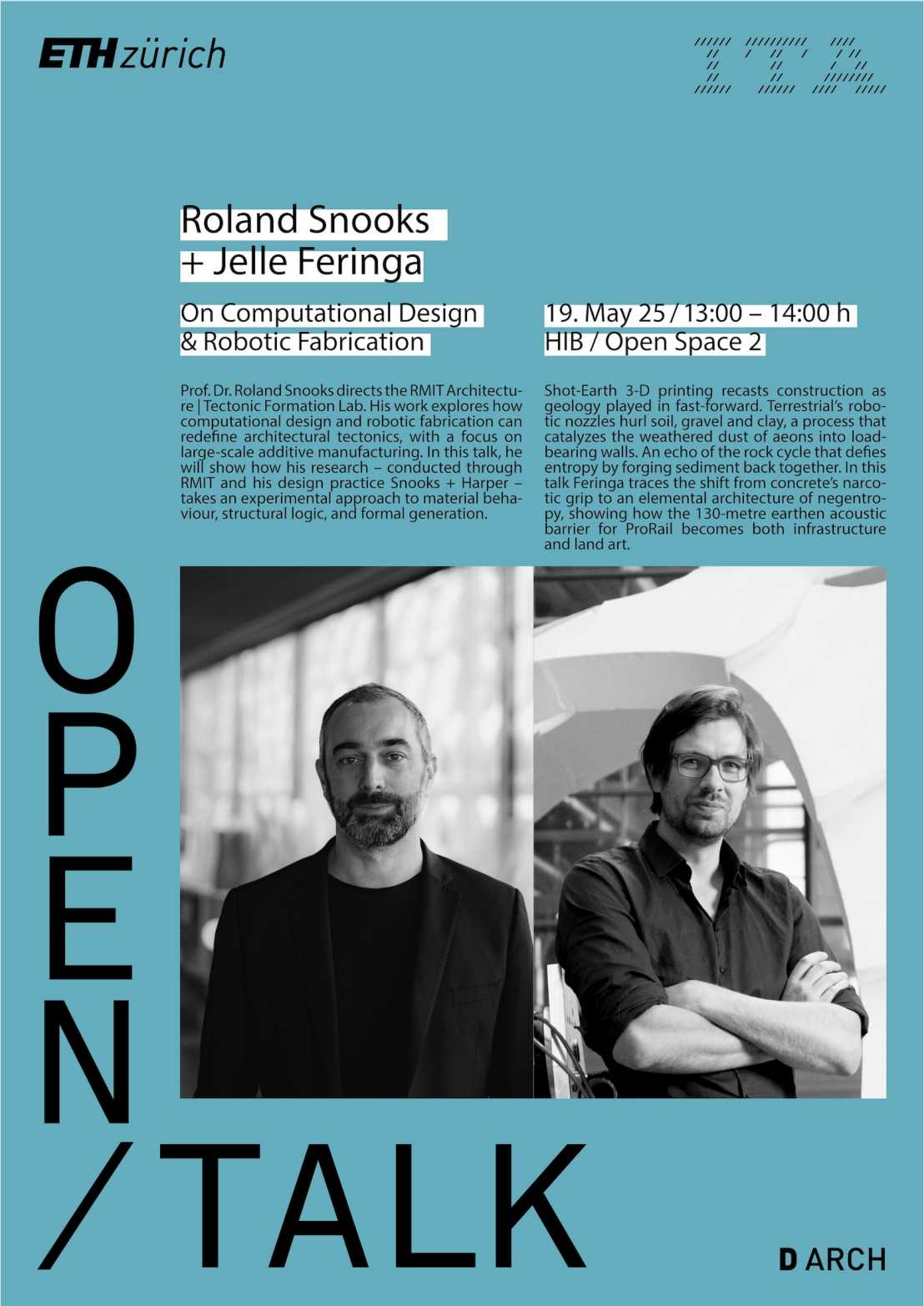
Roland Snooks & Jelle Feringa
On Computational Design and Digital Fabrication
19 May 2025
In this double feature talk, Prof. Roland Snooks RMIT / Tectonic Formation Lab, and Dr. Jelle Feringa, Founder Odico A/S, Aectual, and Terrestial, discuss their own research and practice with the focus on computational design and digital fabrication.
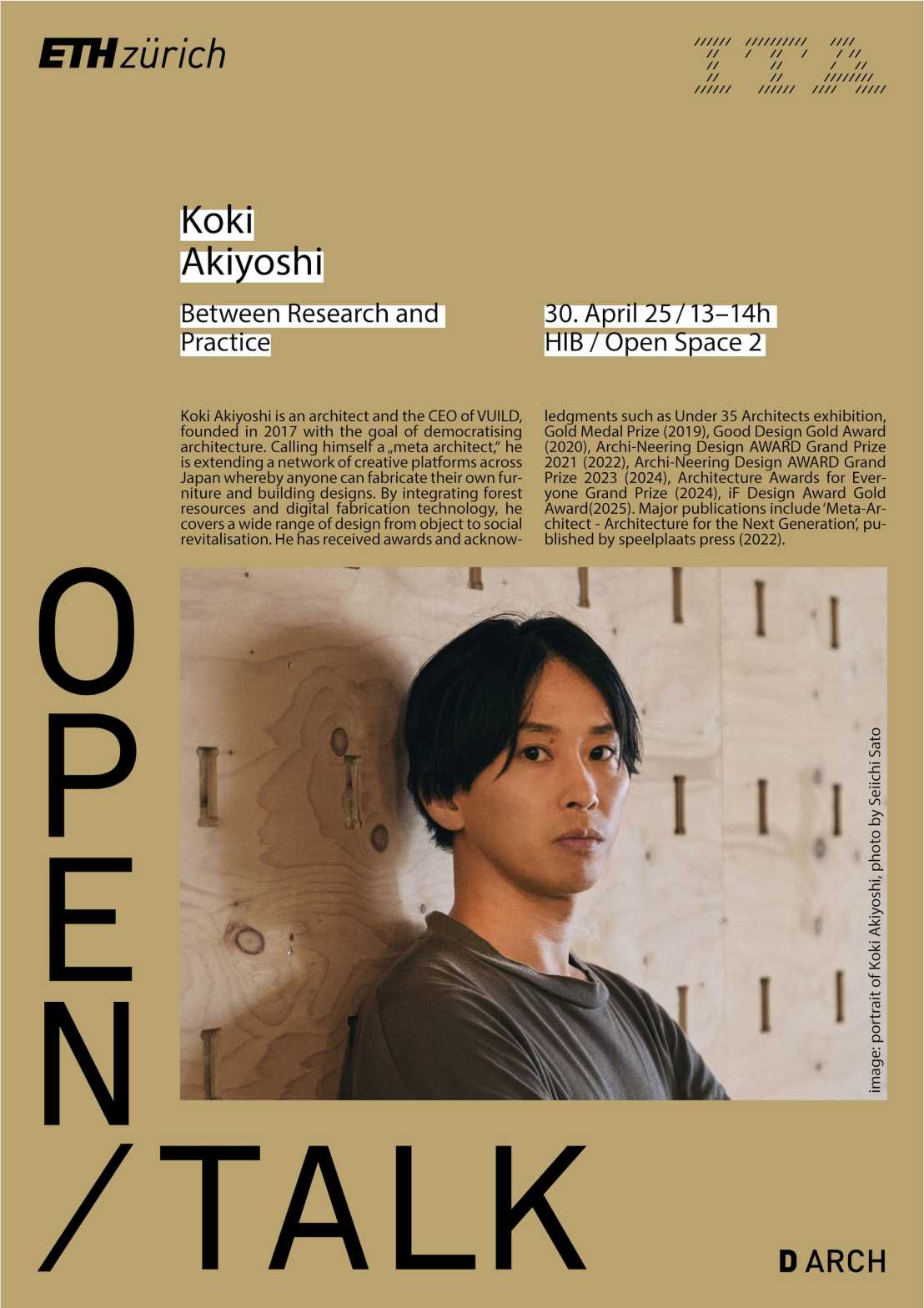
Koki Akiyoshi
Between Research and Practice
30 April 2025
Koki Akiyoshi is an architect and the CEO of VUILD, founded in 2017 with the goal of democratising architecture. Calling himself a "meta architect," he is extending a network of creative platforms across Japan whereby anyone can fabricate their own furniture and building designs. By integrating forest resources and digital fabrication technology, he covers a wide range of design from object to social revitalisation.
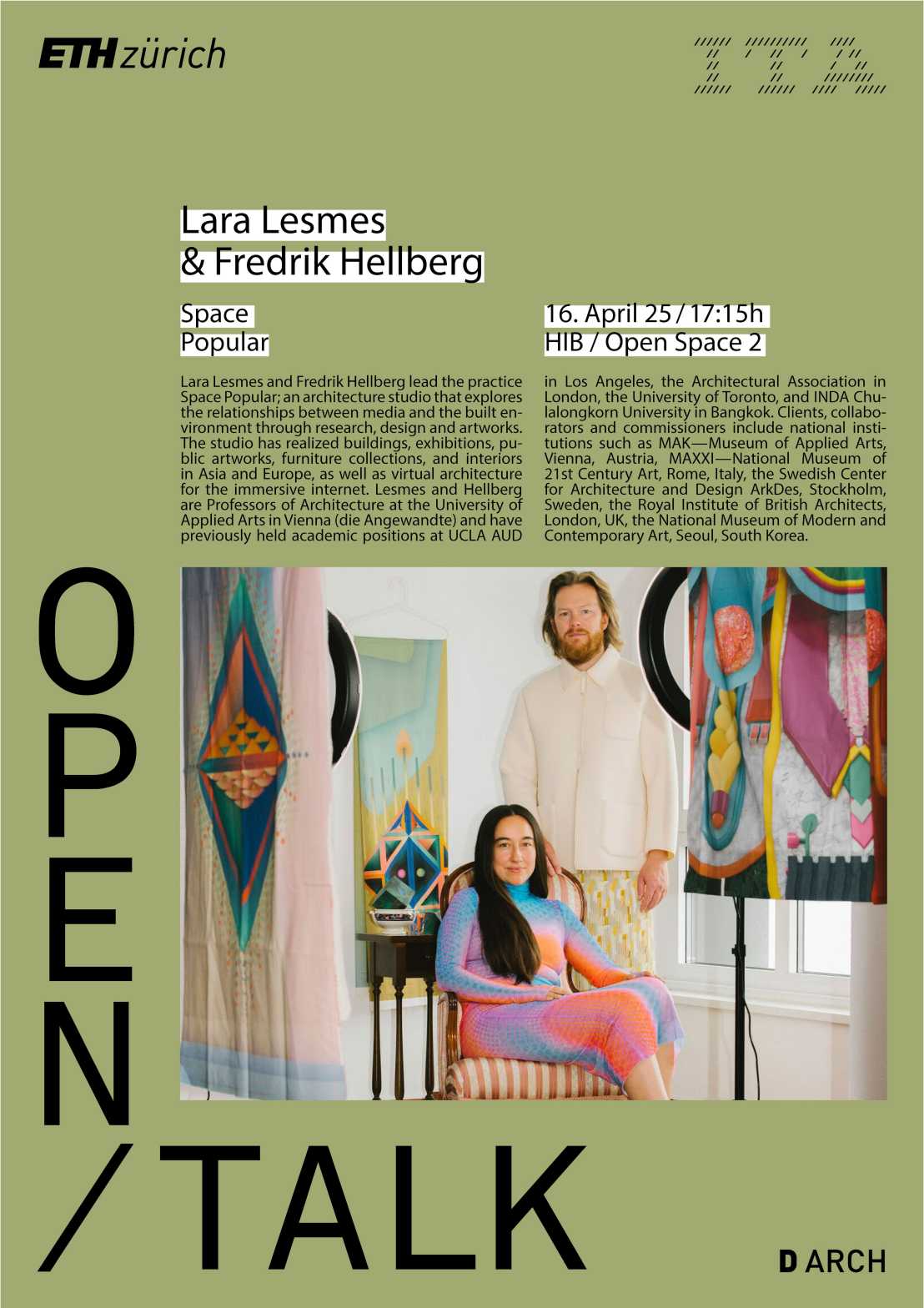
Lara Lesmes & Fredrik Hellberg
Space Popular
16 April 2025
This talk is about Space Popular, an architecture studio that explores the relationships between media and the built environment through research, design and artworks. The studio has realised buildings, exhibitions, public artworks, furniture collections, interiors and virtual architecture for the immersive internet. Lesmes and Hellberg are Professors of Architecture at the University of Applied Arts in Vienna (die Angewandte) and co-founders of Space Popular.
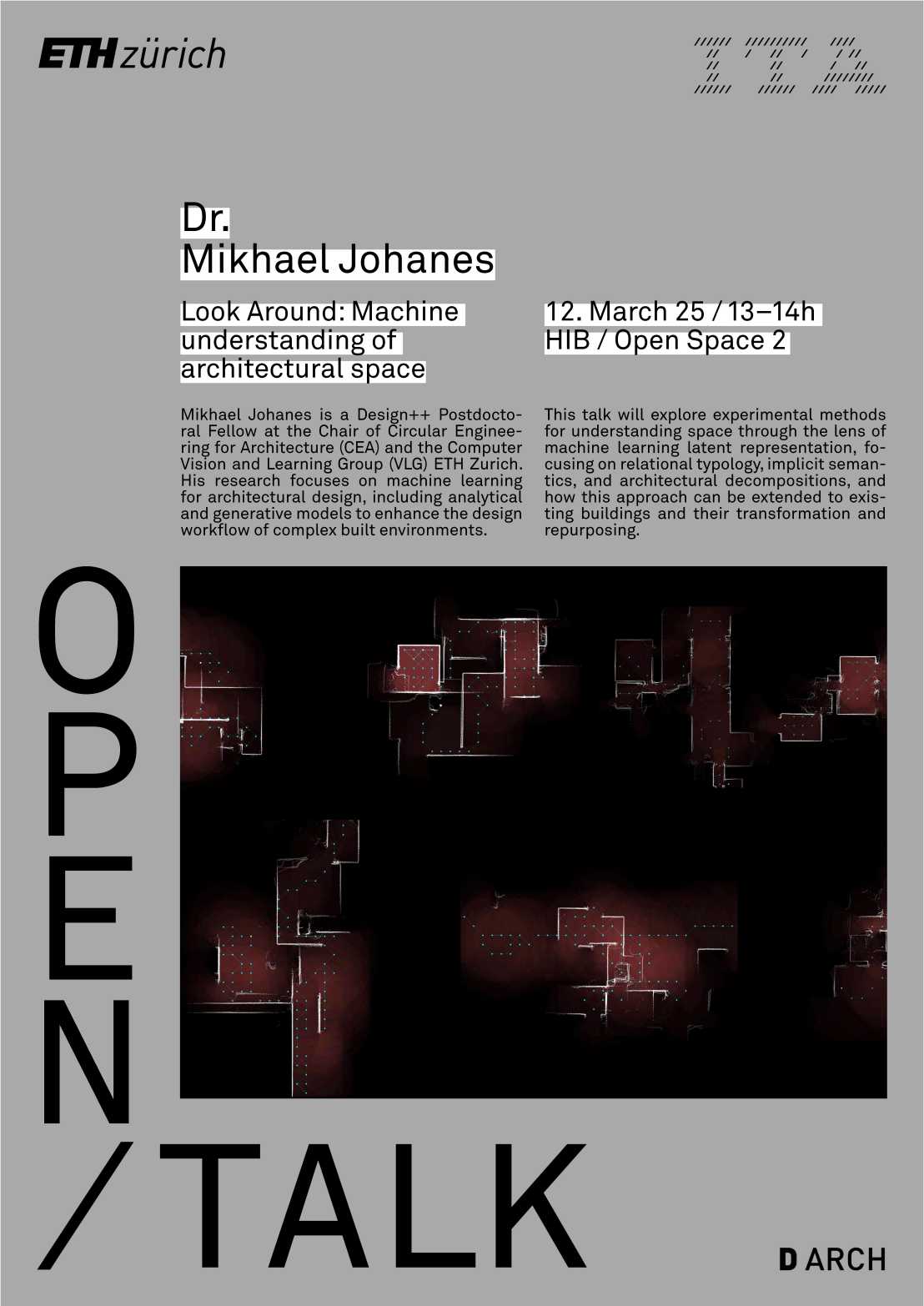
Mikhael Johanes
Look Around: Machine Understanding of Architectural Space
12 March 2025
Mikhael Johanes is a Design++ Postdoctoral Fellow at the Chair of Circular Engineering for Architecture (CEA) and the Computer Vision and Learning Group (VLG) ETH Zurich. His research focuses on machine learning for architectural design.
In this talk he explored experimental methods for understanding space through the lens of machine learning latent representation, focusing on relational typology, implicit semantics, and architectural decompositions, and how this approach can be extended the transformation of exisitng buildings.
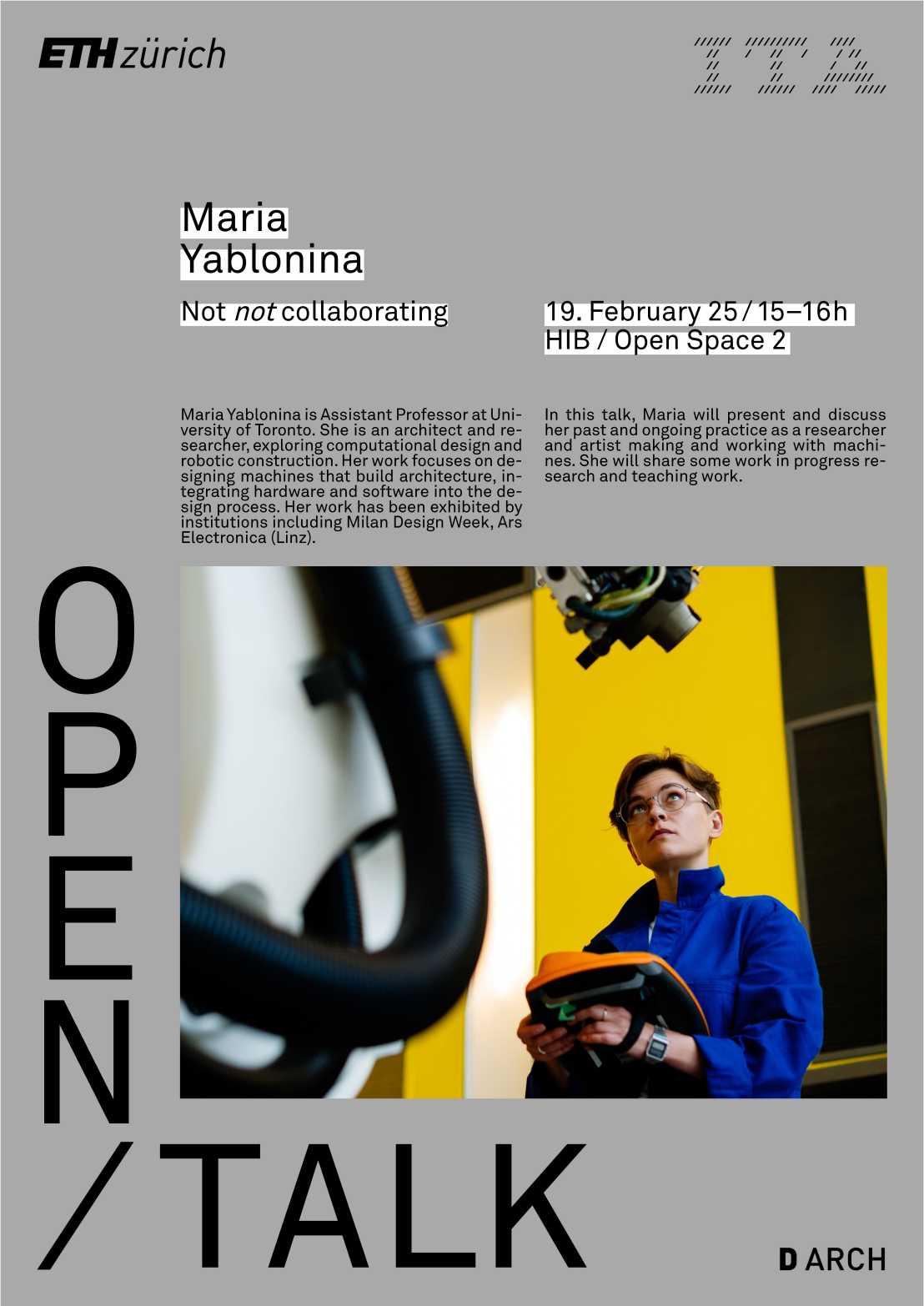
Maria Yablonina
Not Not Collaborating
19 February 2025
Maria Yablonina is Assistant Professor at University of Toronto. She is an architect and researcher, exploring computational design and robotic construction. Her work focuses on designing machines that build architecture, integrating hardware and software into the design process. Her work has been exhibited by institutions including Milan Design Week, Ars Electronica (Linz).
In this talk, Maria will present and discuss her past and ongoing practice as a researcher and artist making and working with machines. She will share some work in progress research and teaching work.
ITA Open Talks | Spring Semester 2024
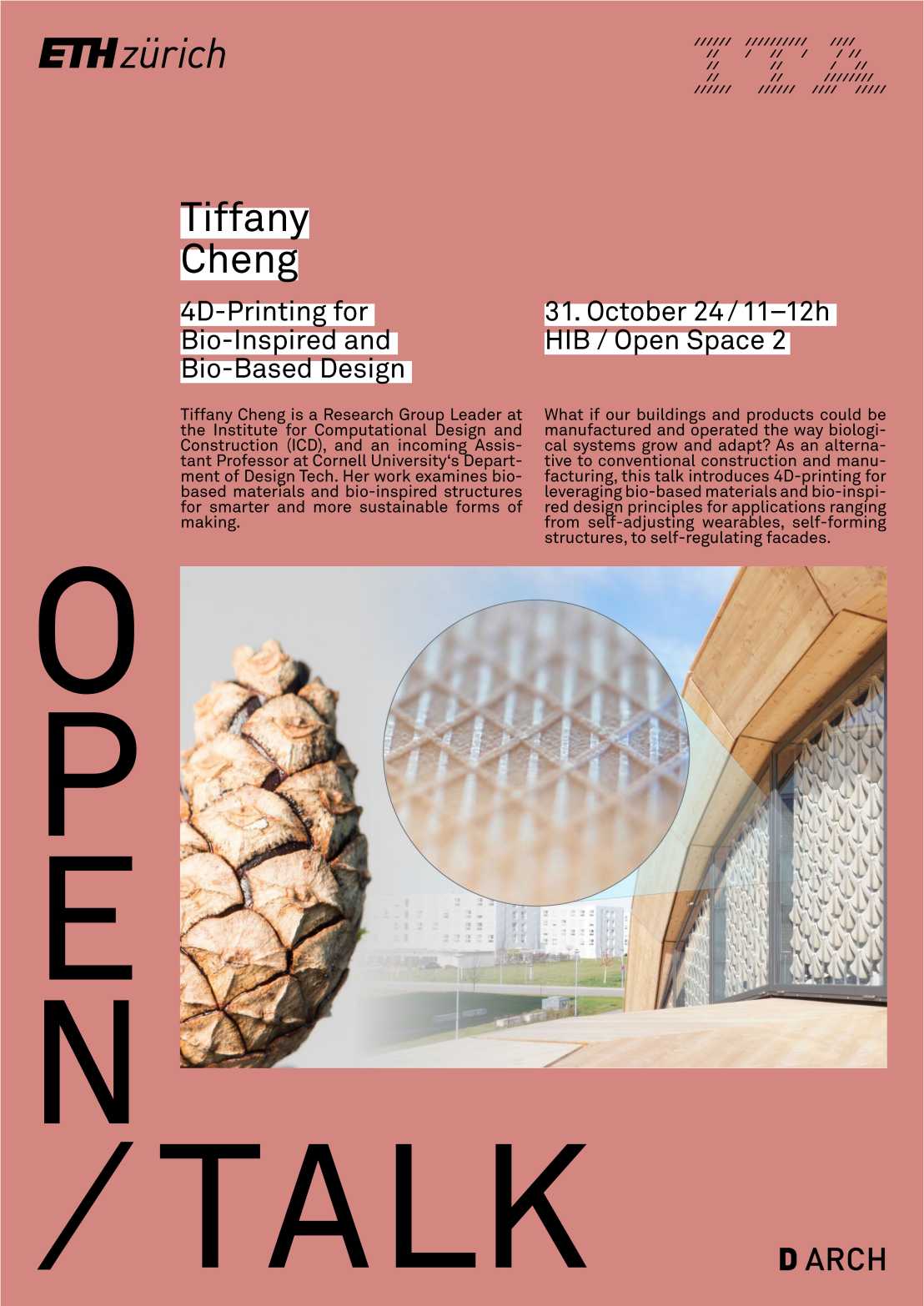
Tifany Cheng
4D-Printing for Bio-Inspired and Bio-Based Design
31 October 2024
Dr. Tiffany Cheng is a Research Group Leader at the Institute for Computational Design and Construction. Her work examines bio-based materials and bio-inspired structures for smarter and more sustainable forms of making.
In this talk, she examines the idea of what if our buildings and products could be manufactured and operated the way biological systems grow and adapt? This talk introduces 4D-printing for leveraging bio-based materials and bio-inspired design principles for applications ranging from self-adjusting wearables, to self-regulating facades.
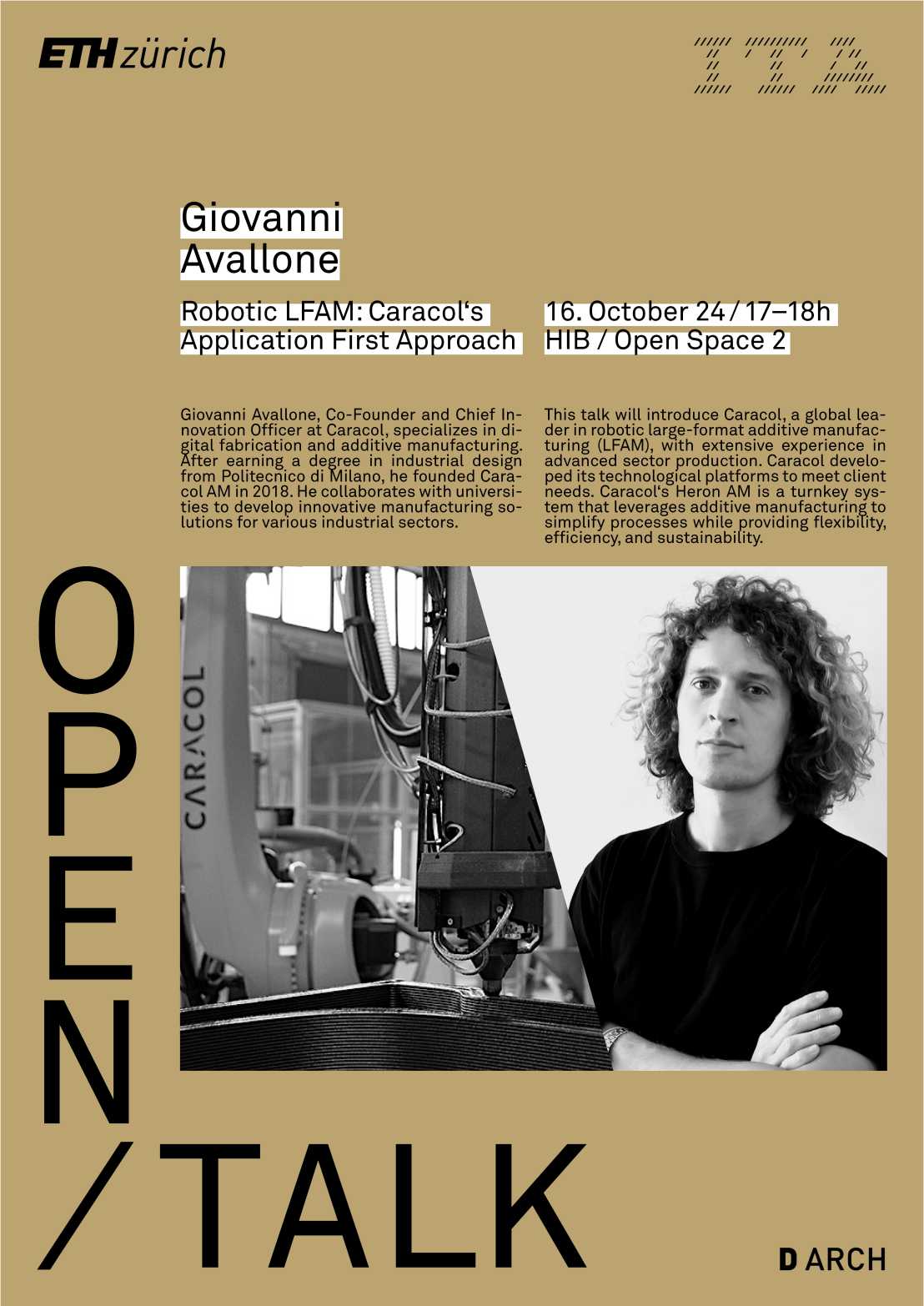
Giovanni Avallone
Robotic LFAM
16 October 2024
Giovanni Avallone is the Co-Founder and Chief Innovation Officer at Caracol AM, and specialises in digital fabrication and additive manufacturing. Giovanni collaborates with universities to develop innovative manufacturing solutions for various industrial and advanced sectors.
This talk introduces Caracol AM, a global leader in robotic large-format additive manufacturing (LFAM), with extensive experience in advanced sector production. Caracol developed its technological platforms to meet the needs of a whole spectrum of niche clients.
ITA Open Talks | Fall Semester 2024
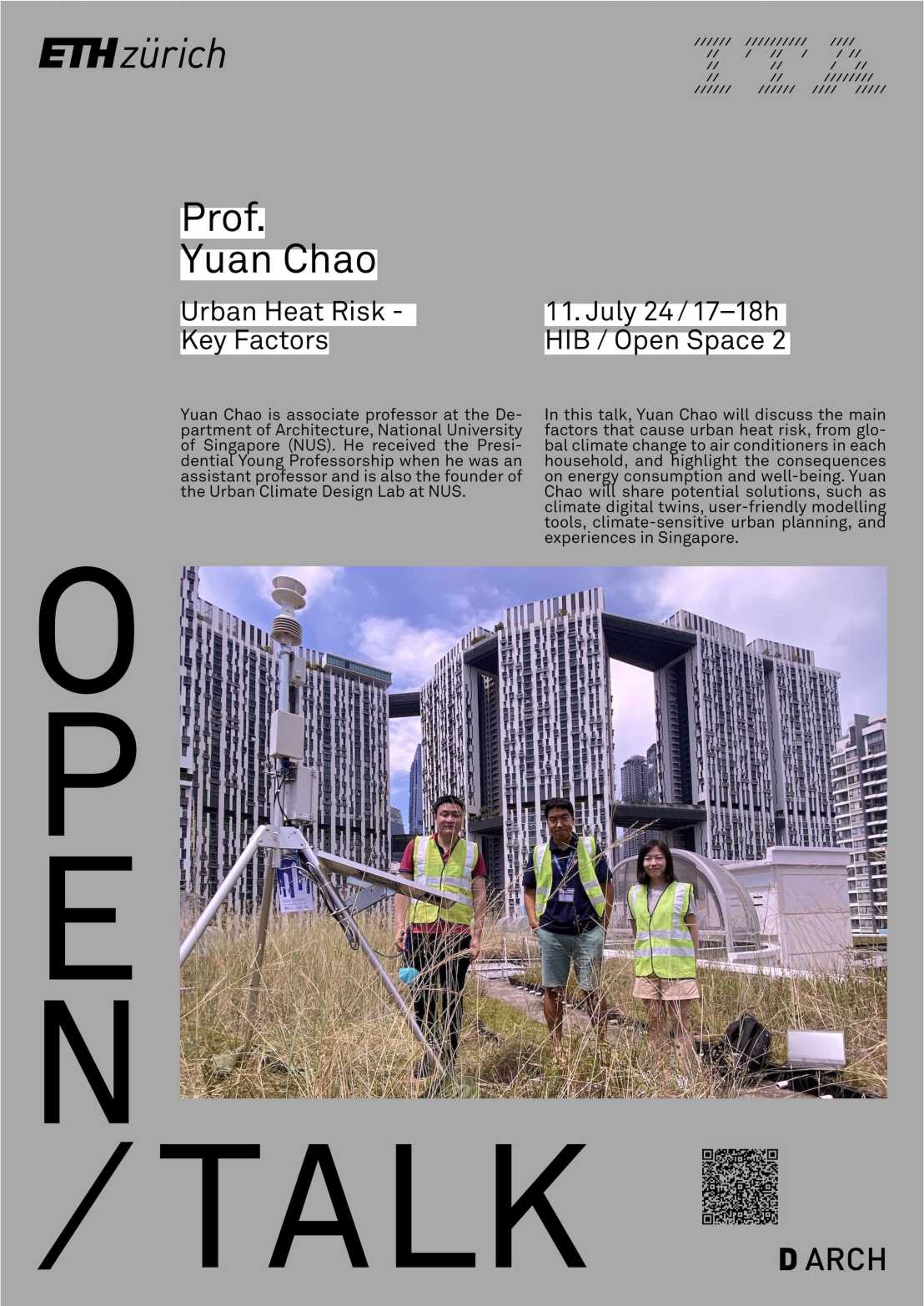
Yuan Chao
Urban Heat Risk
11 July 2024
Yuan Chao is Associate Professor at the Department of Architecture, NUS. He received the Presidential Young Professorship when he was an Assistant Professor and is also the founder of the Urban Climate Design Lab at NUS.
In this talk, Yuan Chao will discuss the main factors that cause urban heat risk, from global climate change to air conditioners in each household and highlight the consequences on energy consumption and well-being. Yuan Chao will share potential solutions, such as climate digital twins, user-friendly modelling tools, climate-sensitive urban planning, and experiences in Singapore.
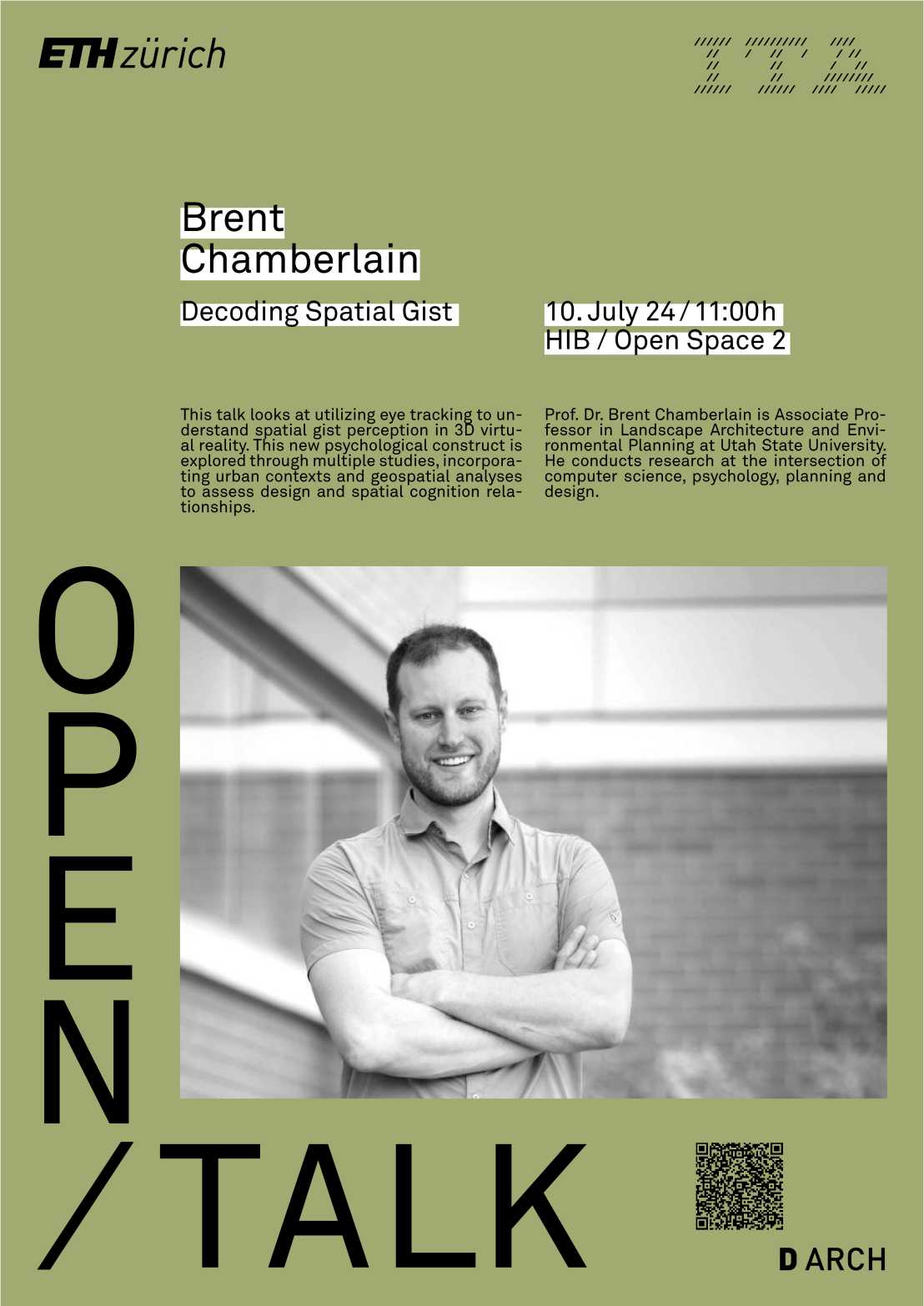
Brent Chamberlain
Decoding Spatial Gist
10 July 2024
Prof. Dr. Brent Chamberlain is Associate Professor in Landscape Architecture and Environmental Planning at Utah State University. He conducts research at the intersection of computer science, psychology, planning and design. See more at: http://brentchamberlain.org.
This talk looks at utilizing eye tracking to understand spatial gist perception in 3D virtual reality. This new psychological construct is explored through multiple studies, incorporating urban contexts and geospatial analyses to assess design and spatial cognition relationships.
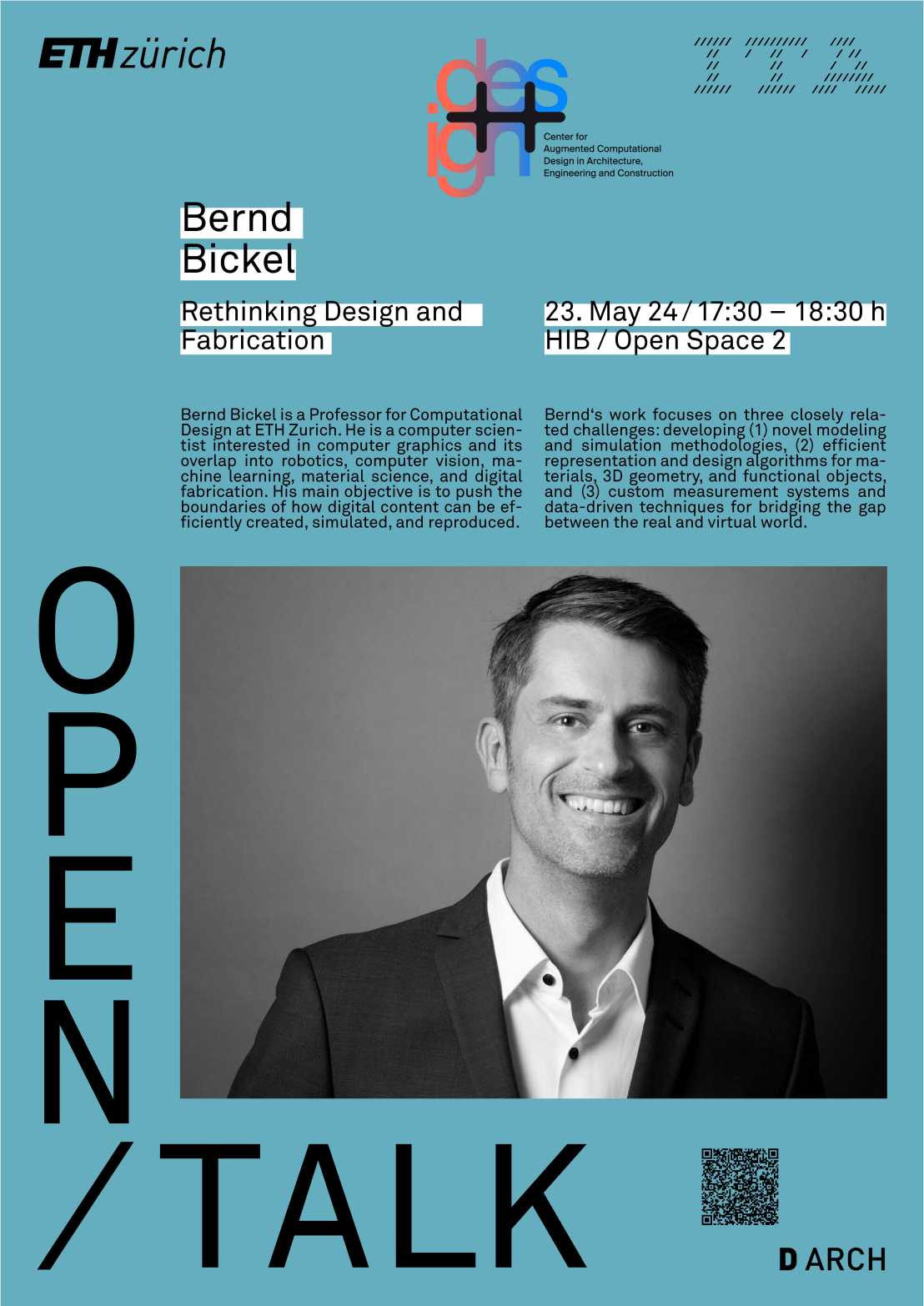
Bernd Bickel
Rethinking Design and Fabrication
23 May 2024
Bernd Bickel is a Professor for Computational Design at ETH Zurich. He is a computer scientist interested in computer graphics and its overlap into robotics, computer vision, machine learning, material science, and digital fabrication.
This talk will showcase Bernd‘s work, which focuses on three challenges: developing (1) novel modeling and simulation methodologies, (2) efficient representation and design algorithms for materials, 3D geometry, and functional objects, (3) custom measurement systems and data-driven techniques for bridging the gap between real and virtual world.
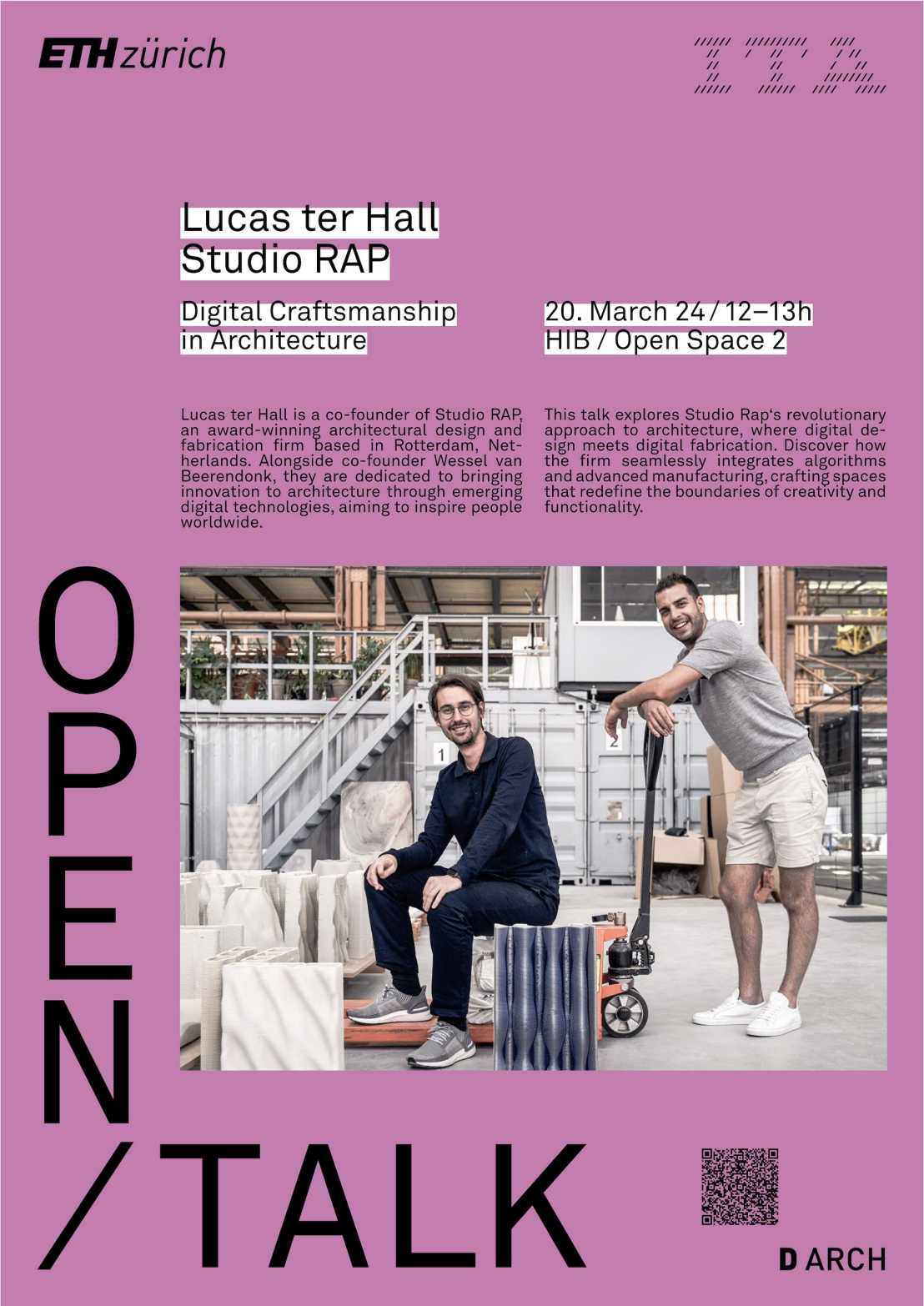
Lucas ter Hall
Digital Craftsmanship in Architecture
20 March 2024
Lucas ter Hall is a co-founder of Studio RAP, an award-winning architectural design and fabrication firm based in Rotterdam, Netherlands. Alongside co-founder Wessel van Beerendonk, they are dedicated to bringing innovation to architecture through emerging digital technologies, aiming to inspire people worldwide.
This talk explores Studio RAP‘s revolutionary approach to architecture, where digital design meets digital fabrication. Discover how the firm seamlessly integrates algorithms and advanced manufacturing, redefining the boundaries of creativity and functionality.
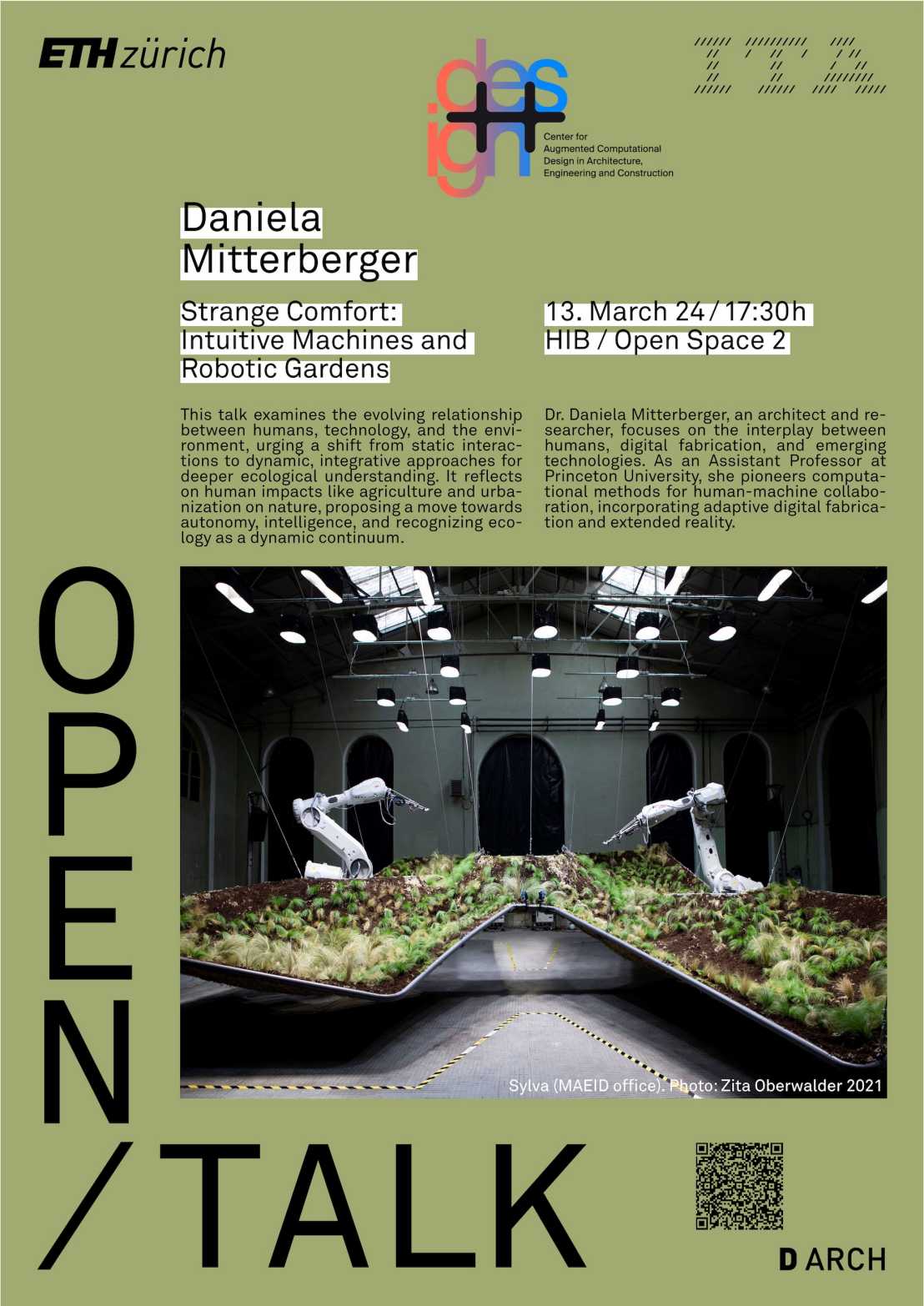
Daniela Mitterberger
Strange Comfort: Intuitive Machines and Robotic Gardens
13 March 2024
Dr. Daniela Mitterberger, an architect and researcher, focuses on the interplay between humans, digital fabrication, and emerging technologies. As an Assistant Professor at Princeton University, she pioneers computational methods for human-machine collaboration, incorporating adaptive digital fabrication and extended reality.
This talk examines the evolving relationship between humans, technology, and the environment, urging a shift from static interactions to dynamic, integrative approaches for deeper ecological understanding.
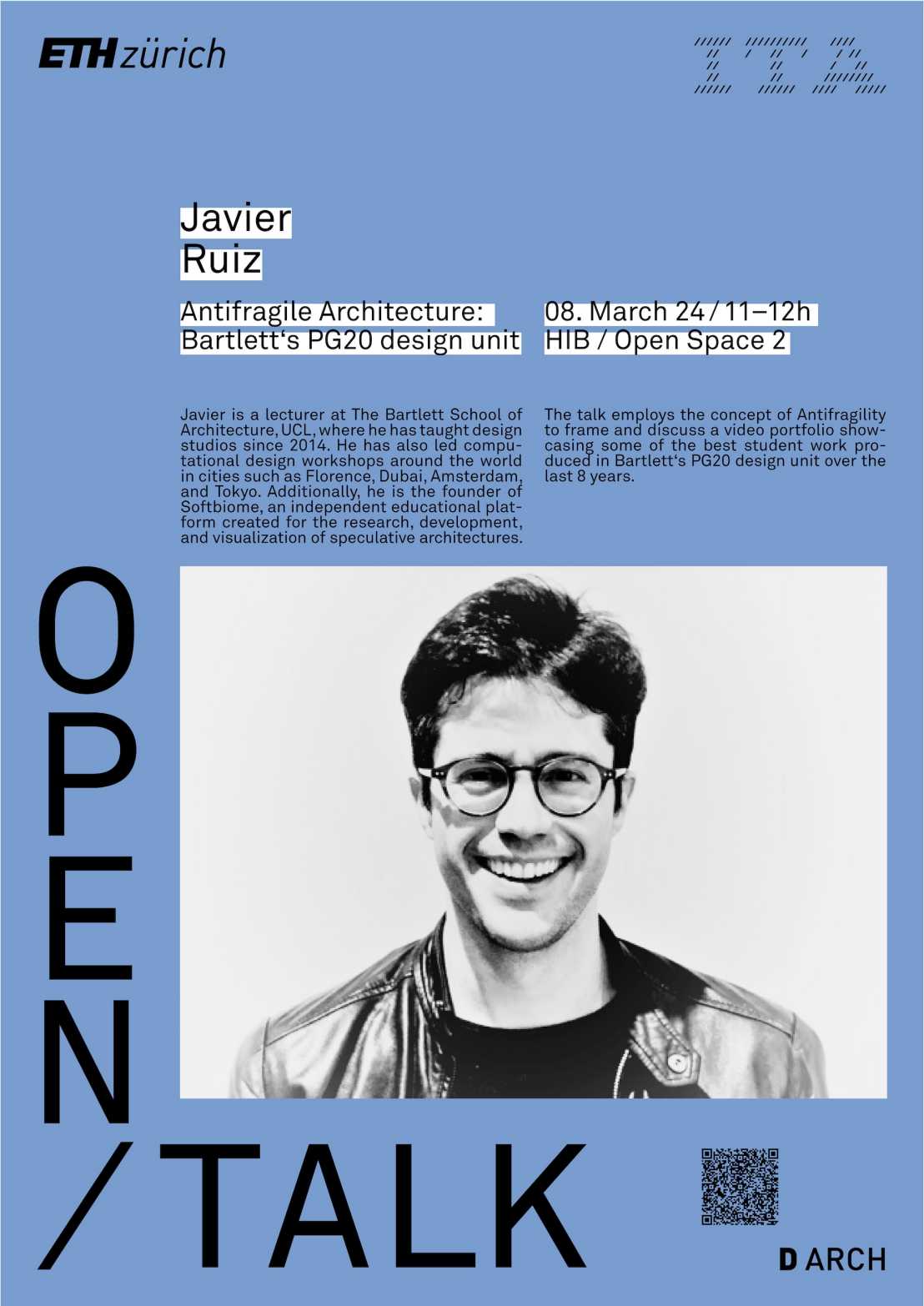
Javier Ruiz
Antifragile Architecture: Bartlett's PG20
08 March 2024
Javier is a lecturer at The Bartlett School of Architecture, UCL, where he has taught design studios since 2014. He has also led computational design workshops around the world in cities such as Florence, Dubai, Amsterdam, and Tokyo. Additionally, he is the founder of Softbiome, an independent educational platform created for the research, development, and visualization of speculative architectures.
The talk employs the concept of Antifragility to frame and discuss a video portfolio showcasing some of the best student work produced in Bartlett‘s PG20 design unit over the last 8 years.
ITA Open Talks | Fall Semester 2023
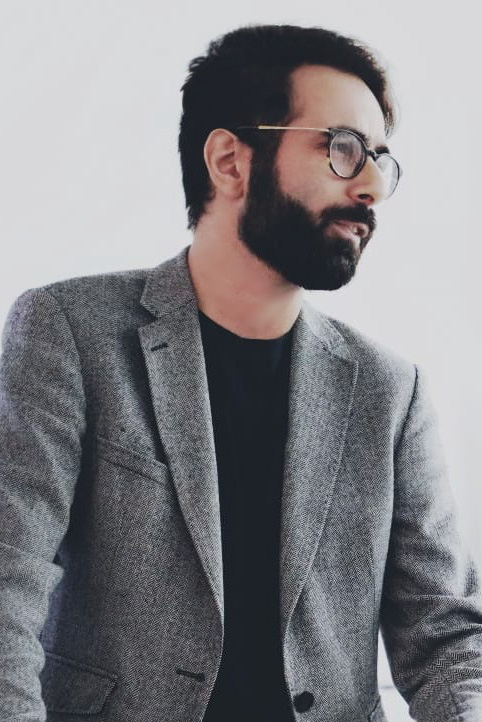
Roberto Naboni| CREATE | 15 December 2023
Roberto Naboni, (PhD. Hons, Architect) is Associate Professor in Computational Design and Digital Fabrication at the University of Southern Denmark (SDU), where he leads CREATE, the Center for Computational Research in Emergent Architectural Technology and Engineering, which he founded in 2018. At the core of Roberto's work is the advancement of experimental projects in sustainable architecture, fostering innovative concepts through research-driven progress in design computation, construction robotics, and material innovation. Roberto's extensive research portfolio includes over 80 scientific publications spanning books, journals, and conference articles. He is also a frequent speaker, with more than 50 keynotes and lectures. Roberto has engaged in collaborations with international research centres, including ICD/ITKE Stuttgart, AAVS School, and Politecnico di Milano, where he previously co-founded and led ACTLAB. He worked on projects with various architectural firms and tech companies, including Skidmore Owings and Merrill, EMBT, Stefano Boeri Studio, ecoLogicStudio, Odico, and WASP.
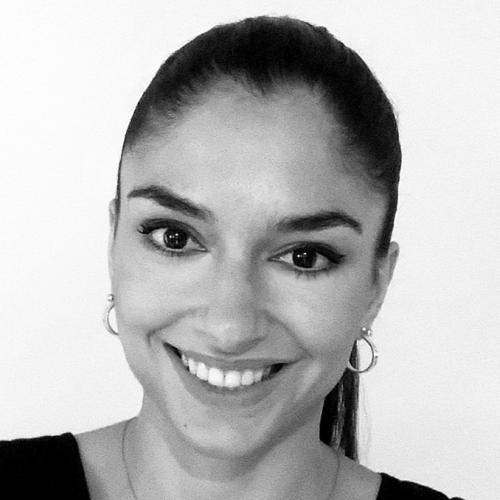
Antiopi Koronaki|Creative Rationalization in Design. | 11 December 2023
Antiopi Koronaki is an Assistant Professor in Design Computation and Fabrication in the Department of Architecture at the University of Cambridge. Her research interests lie at the intersection of architecture, engineering, and materials with a focus on advanced fabrication and computational analysis methods. Her work has explored the potential of engineered timber for modular, off-site manufactured schools in the UK. This approach enables the reduction of the environmental impact of the construction industry through the promotion of natural construction materials and modern methods of construction. She holds a PhD from the University of Bath on the optimisation of large-scale, freeform space-frame structures for construction. Since 2014 she has been heavily involved in teaching at higher education institutions internationally and she is part of the team developing the Design Tripos, a new undergraduate degree at the University of Cambridge, which integrates architecture, engineering and material science to address global environmental and social challenges.
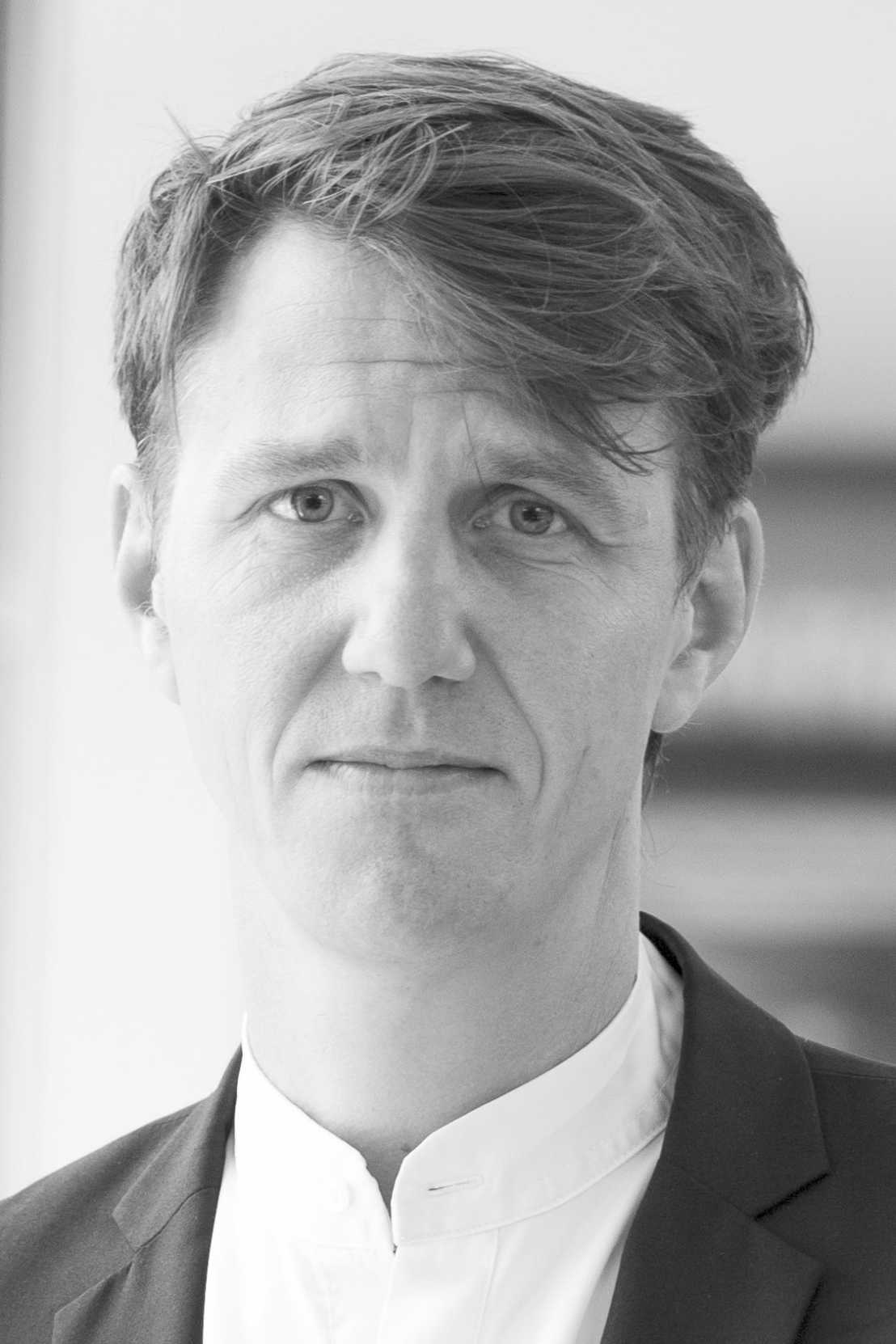
Klaas De Rycke| Lost in Translation – the Engineer as Translator | 20 November 2023
Klaas De Rycke joined Bollinger+Grohmann Ingenieure in 2003. From 2005 onwards, he relocated to Paris for Bollinger+Grohmann to assist Dominique Perrault Architects on the Mariinsky Theatre project in St. Petersburg. In 2007 he established Bollinger+Grohmann Paris, and the office has currently 30 permanent collaborators. Since 2015, he manages the Brussels office, and he is Partner of Bollinger+Grohmann Holding AG. Since 2008, Klaas works as an Assistant Professor for the Department of Architecture & Structural Development at the University of Ghent, Belgium. In 2011, he was appointed as Guest Professor in the field of Innovative Engineering at the Architecture School of Versailles, France (ENSA-V), and since 2018 he is Senior Teaching Fellow at The Bartlett School of Architecture in London UK. His key area of expertise is structural and façade design, and he has extensive knowledge in the design of geometrically complex free-form structures in combination with challenging façade systems. Klaas regularly participates in international conferences and symposia and is the author/co-author of numerous articles on engineering topics.
Developing building concepts with clients, with architects and artists, can be a long and sinuous path, and it requires the engineer to be a skilled translator, translating between the desired outcome and the process needed to get there. In his lecture, Klaas De Rycke will focus on the role of the design engineer as THE interpreter: "the interpreter's goal is for people to experience the target language as seamlessly as if it were the source language." The structural interpreter needs to understand and be able to develop the concept and translate it into the language of structural engineering and back to the design. Specifically, when working with art installations or temporary showcase pavilions, the engineer needs to think way beyond the straight-jacket of regulations. Klaas will highlight how the methods, models, and tools he used in working on art collaborations with Tomas Saraceno, Solano Benitez, and Olafur Eliassion, functioned partially as design research, and how he has then been able to deploy them in the development of other projects such as the RTS with OfficeKGDVS.
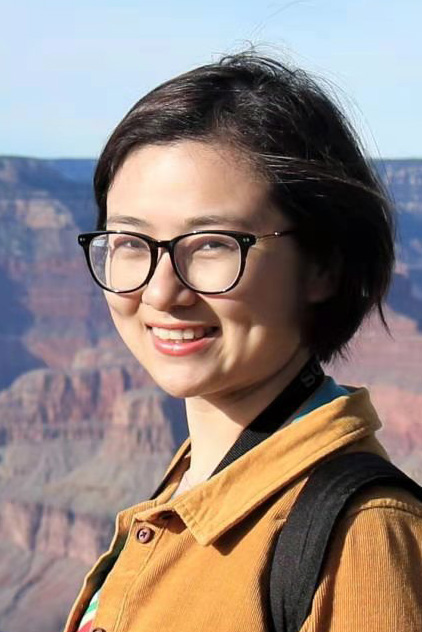
Yige Liu| Computational Textiles and Application Potentials in Building Envelopes | 02 October 2023
Yige Liu is a postdoctoral fellow at the Institute of Architectural Algorithms & Applications in the School of Architecture at Southeast University. She received both her Ph.D. and master degrees in architecture from Tongji University and her bachelor degree in architecture from Southeast University. From 2016 to 2017, she was also a visiting student at the MIT Department of Architecture. Her research focused on 3D knitting technologies, fiber / membrane materials, and textile structures. She explored their performance-based design methods and their potential applications in creating innovative building enclosures.
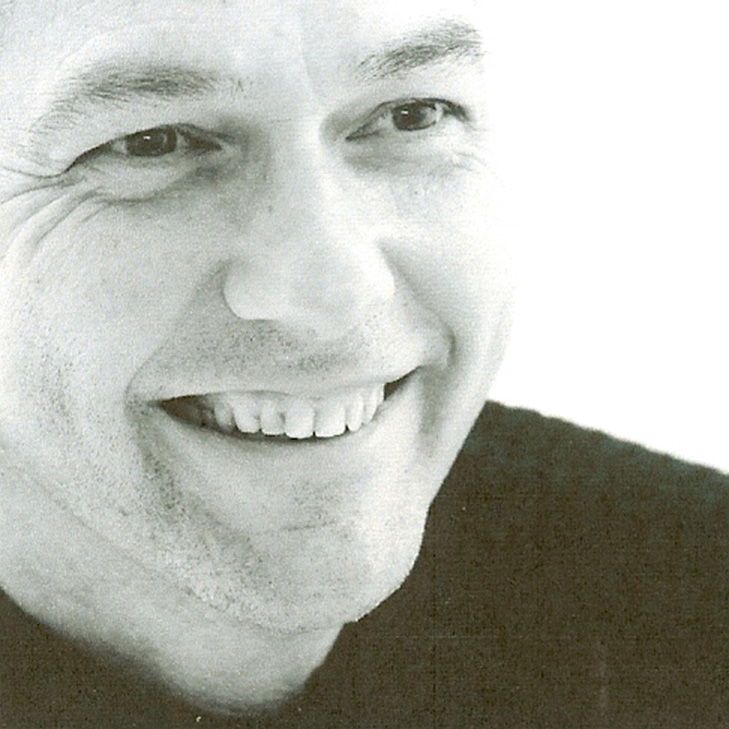
Neil Thomas| Two Worlds| 26 September 2023
Neil Thomas is the Founder and Director of Atelier One, which has been described as “the most innovative engineering practice in the UK”. In 2014 Neil was elected as Royal Designer for Industry (RDI), an Honorary RIBA Fellowship for both the excellence and the inventiveness of his contribution to Architecture over the past 25 years and in 2015 was awarded Fellow of the Institute of Structural Engineers. In 2016 Neil was honoured with an MBE on the Queen’s 90th Birthday for contributions to Architecture, Design and Engineering, and he received Milne Medal in 2019. Since visiting Bali over 8 years ago, Neil has become more involved with the design and development of bamboo structures. Neil is a regular lecturer at Bamboo U, an adjunct of the Green School - Bali, teaching the engineering principles behind bamboo design. He also holds a number of high-profile posts in the UK & US educational service, most recently being a Visiting Professor to Yale and MIT. He recently wrote the Technical Appendix for Bamboo Contemporary, published by Princeton Press.
From the speaker: "I have run Atelier One with Aran Chadwick for 30 years and for a large part of that, amongst other things, we have worked on the engineering of rock-n-roll stage sets which travel the world. With the construction industry producing 30/40% of all greenhouse gases climate change must be addressed. In the last 10 years our attitude towards our engineering has changed as we must consider a new world, with a new approach to our environment and sustainability."
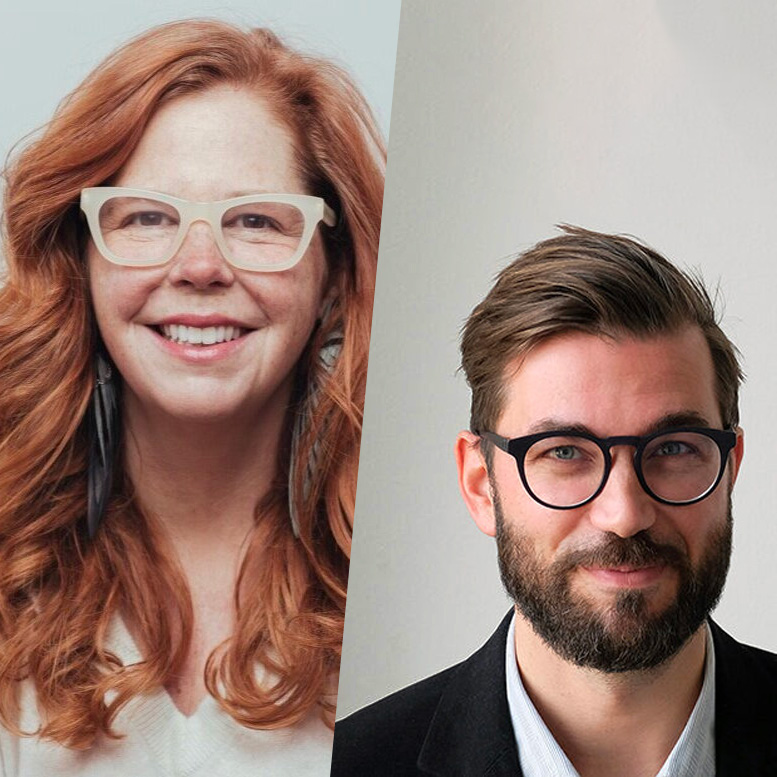
Virginia San Fratello & Norman Hack| New Material Processes in Architecture | 25 September 2023
Virginia San Fratello is an educator, designer and creative technologist. She is the Chair of the Department of Design at San Jose State University in Silicon Valley, and an International Interior Design Association (IIDA) Educator of the Year recipient. She is a design activist, author, and thought leader within the fields of additive manufacturing, architecture, interior and product design. She has served in the role of Distinguished Visiting Professor at the Massachusetts Institute of Technology, the University of Arkansas, and The University of Queensland. In 2014, her creative practice was named an Emerging Voice by The Architectural League of New York—one of the most coveted awards in North American architecture. In 2016, her practice was also awarded the Digital Practice Award of Excellence by the The Association for Computer Aided Design in Architecture (ACADIA), and in 2020 it received the Art + Technology Award from the Los Angeles County Museum of Art (LACMA). In 2020, the Pink Borderwall Teeter Totters project, installed on the border between the USA and Mexico, was awarded the Beasley Design of the Year Award. San Fratello is the co-author of Printing Architecture: Innovative Recipes for 3D Printing (Princeton Architectural Press 2018), a book that reexamines the building process from the bottom up and offers illuminating case studies for 3D printing with materials like chardonnay grape skins, salt and sawdust. She is also a partner in Emerging Objects, a creatively driven, 3D Printing MAKE-tank specializing in innovations in 3D printing architecture, building components, environments and products (a short documentary of their work can be seen here). You can find out more about her work here: https://www.rael-sanfratello.com/
Norman Hack is an architect and researcher in the field of digital fabrication. He holds a degree in architecture from Technical University Vienna and the Architectural Association in London. Following his graduation, he worked as a programming architect in the Digital Technologies Group at Herzog and de Meuron. His interest in seamless digital design and fabrication processes led him to pursue a doctorate with Gramazio Kohler Research at the Institute of Technology in Architecture, ETH Zürich, as part of the NCCR Digital Fabrication. Since 2018, Norman holds a Tenure Track Professorship for Digital Building Fabrication at the Institute of Structural Design at Technische Universität Braunschweig. You can find out more about his research work here: https://www.tu-braunschweig.de/ite/team/hack
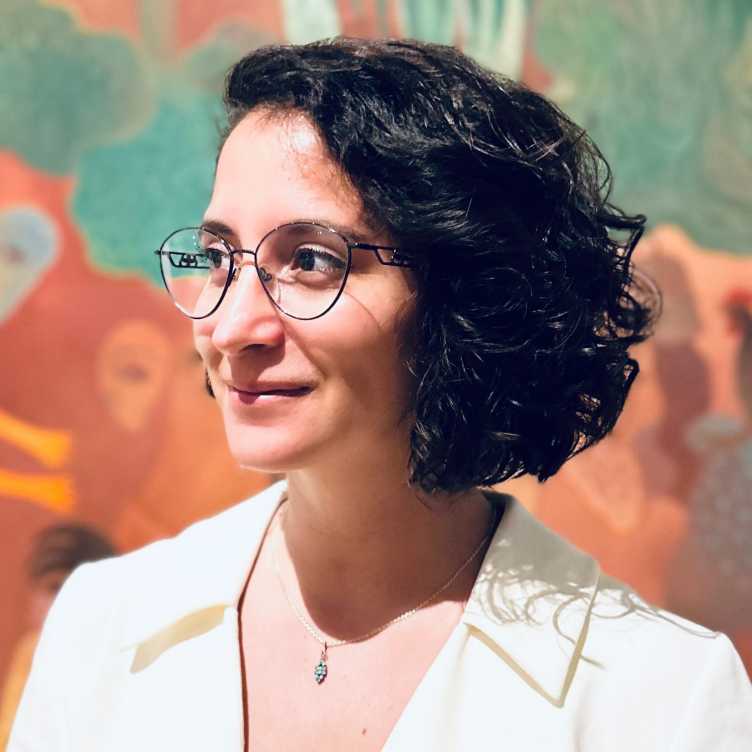
Karla Saldana Ochoa| Evolving Dynamics: Tool & Instruments, Examples of the Interplay between Human and Machine Intelligence in Architecture | 19 September 2023
Karla Saldana Ochoa is a Tenured Track Assistant Professor in the School of Architecture at the University of Florida and a faculty affiliate at the Center of Latin American Studies and FIBER, the Florida Institute of Built Environment Resilience at the University of Florida. Karla is the director of SHARE Lab, a research group focused on developing projects that leverage the interaction between Artificial Intelligence (AI) and human intelligence applied to boost creativity in architectural design and create tools to analyze Big Data of Urban Phenomena. She is an Ecuadorian architect with a Master of Advanced Studies in Landscape Architecture and a Ph.D. in Technology in Architecture from ETH Zurich. Her Ph.D. researched the integration of Artificial and Human Intelligence for an accurate and agile response to natural disasters.
ITA Open Talks | Spring Semester 2023
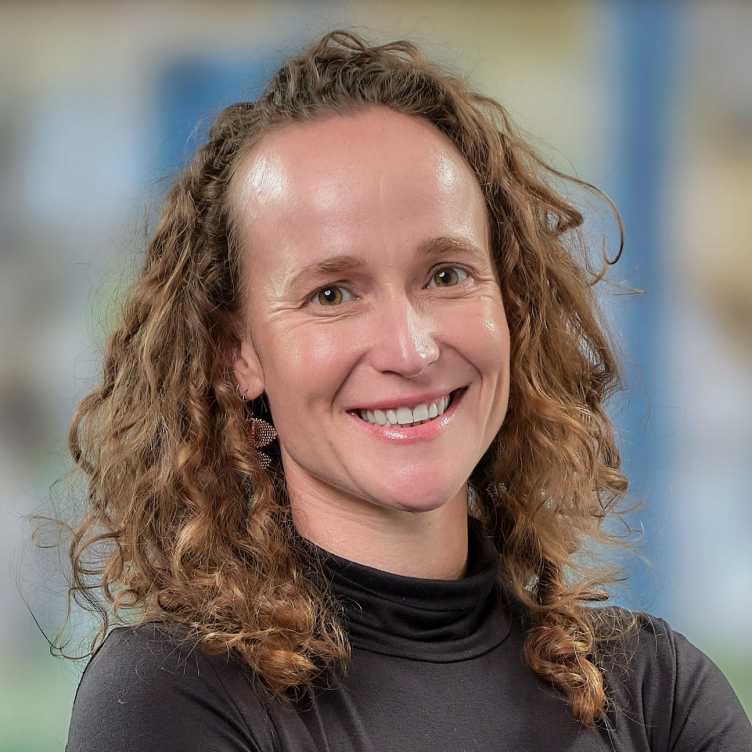
Wiebke Hutiri | Responsible Design Practices for Trustworthy AI: A Design Patterns Approach | 25 July 2023
Wiebke Hutiri is an applied computer scientist who focuses on trustworthy AI and responsible design practices. She has recently submitted her PhD at Delft University of Technology and is currently working as a research intern at Sony AI Ethics team in Zurich. Her research aims to address the limitations of AI systems once deployed, emphasizing risk anticipation, harm mitigation, and alignment with societal values. Wiebke has received recognition and support for her work on fairness in voice technologies, including a Mozilla Technology Fund Award. She is also affiliated with various research initiatives such as the Heidelberg Laureate Forum Young Researchers, the Data Science for Social Good Initiative, and the Diverse Intelligences Summer Institute.
The title of this talk is «Responsible Design Practices for Trustworthy AI: A Design Patterns Approach.» The talk highlights the challenges engineers face in detecting and mitigating bias in AI systems and emphasizes the need for practical guidance. Wiebke proposes using design patterns, inspired by architectural design, as a tool to capture established knowledge and practices in AI fairness. These patterns can be shared among researchers, engineers, and non-technical stakeholders, providing a broader perspective on responsible design practices in AI development.
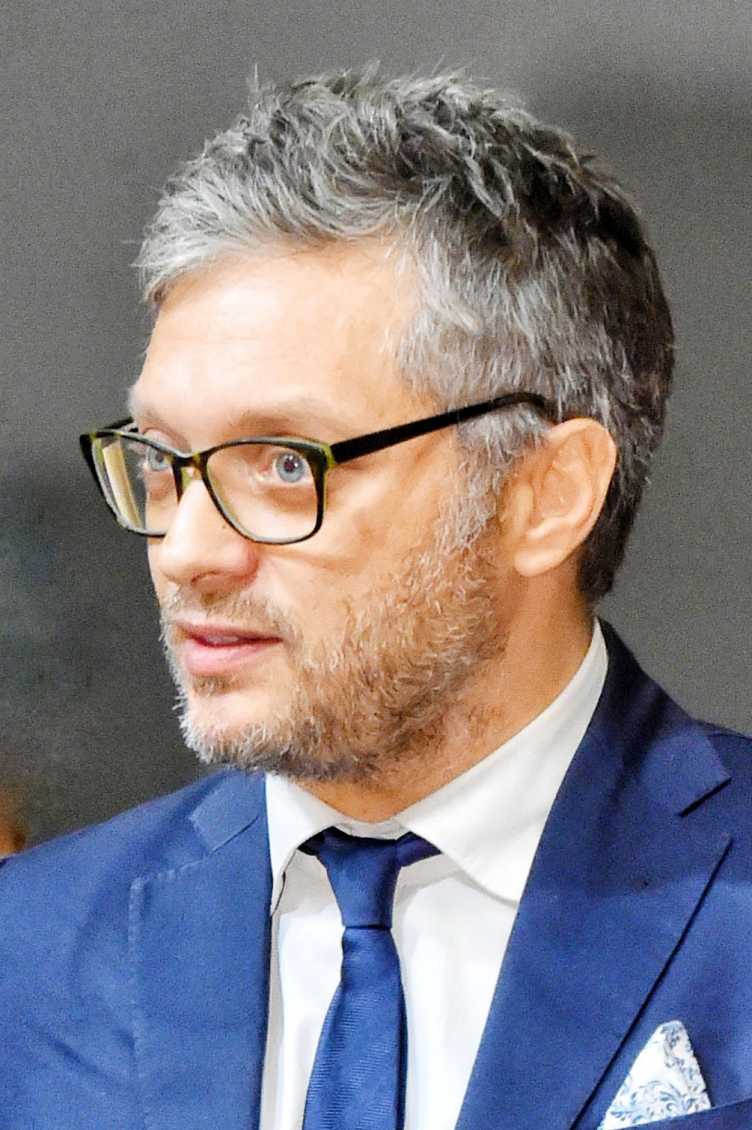
Alfonso Capozzoli | Data Analytics Technologies for Enhancing Energy Management in Buildings | 20 June 2023
Alfonso Capozzoli is a mechanical engineer, and he received his PhD in Engineering of Mechanical Systems in 2006 from University of Naples Federico II (Italy). Currently, he is Associate Professor in building physics and building energy systems at the Department of Energy of Politecnico di Torino, where he leads the Building Automation and Energy Data Analytics lab (www.baeda.polito.it).
In this talk, Alfonso Capozzoli introduces the potentialities of data analytics technologies for enhancing energy management in buildings, and for supporting the process of green and digital transition. In this context, the spread of automation and control systems, Information and Communication Technologies (ICT), and IoT sensors is contributing to an unprecedent availability of long-term monitoring data related to the energy performance and indoor environmental quality of buildings. Thanks to a robust coupling of AI algorithms and energy domain knowledge, this massive amount of data can be effectively analysed and translated into ready-to-implement strategies for optimizing the building performance during operation. The integration of EIS (Energy Information Systems) and ASO (Automated System Optimisation) solutions in modern Building Energy Management Systems is then discussed. In this framework the applications include: i) the automation of processes for the detection and diagnosis of anomalous energy patterns in buildings and their main systems, ii) the development of advanced control strategies in integrated energy systems iii) the definition of robust strategies to enable energy flexibility at both single building and district scale.
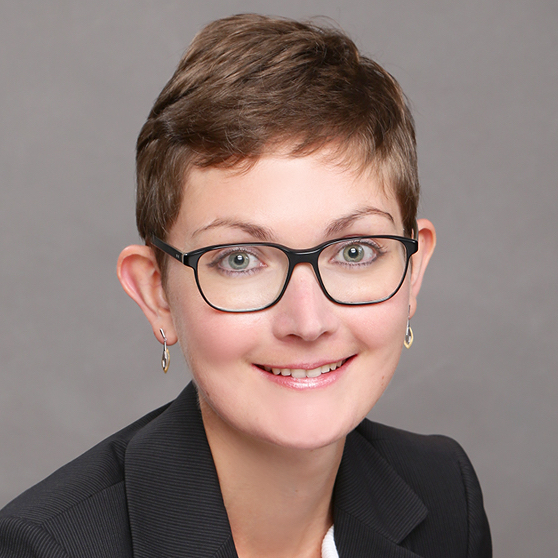
Hortense Le Ferrand | Mycelium-bound Composites for Sustainable Urban Living | 08 May 2023
Hortense Le Ferrand completed engineering degree at ESPCI France, with a major in physical-chemistry. She then went on to complete master degree and PhD, both in materials science, at ETH Zürich. Her PhD work was awarded the silver medal for outstanding thesis, and the materials and processing (MaP) prize. She went on to become a visiting researcher at Purdue University US, before joining Nanyang Technological University (NTU) in Singapore. In 2019, Hortense became assistant professor at NTU in Mechanical and Aerospace Engineering. In 2020 she was awarded the National Research Foundation Fellowship from Singapore. In 2023, Hortense was listed among the MIT innovators list under 35 for her work on 3D printing of multifunctional materials.
Of all the types of ecosystems, cities are the most polluting. To address this issue, multiple aspects have to be considered, among which the materials used for construction, furniture, consumables, day-life appliances, etc., the energy for heating and cooling buildings, and transportation of materials, goods and people. In this talk, I will present our latest research on mycelium-bound composites, made from agricultural waste and fungus, and I will discuss the role they can play in creating more sustainable urban living. First, I will introduce the fabrication of the composites and their properties. Second, I will present how they can be used for the thermal management of buildings. Finally, I will describe how circular biocycles can be put in place and discuss their implications. This project is held under the Future Cities Lab Global from the Singapore- ETH Centre, a collaborative effort between Singapore’s High Education Institutions and ETH Zurich.
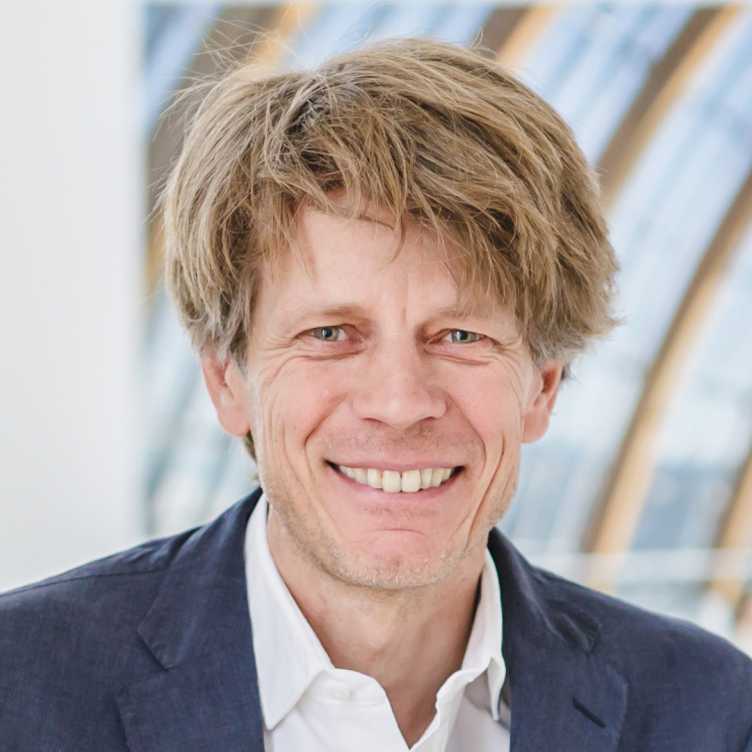
Jan Knippers | Co-design for Resource Efficient Building Structures | 09 March 2023
The lecture focused on how the fundamental research, of both digital planning methods and robotic manufacturing processes, leads to new (and resource efficient) construction approaches. Thank you to Prof. Jan Knippers, The Institute of Building Structures & Structural Design (ITKE), University of Stuttgart.
ITA Open Talks | Fall Semester 2022
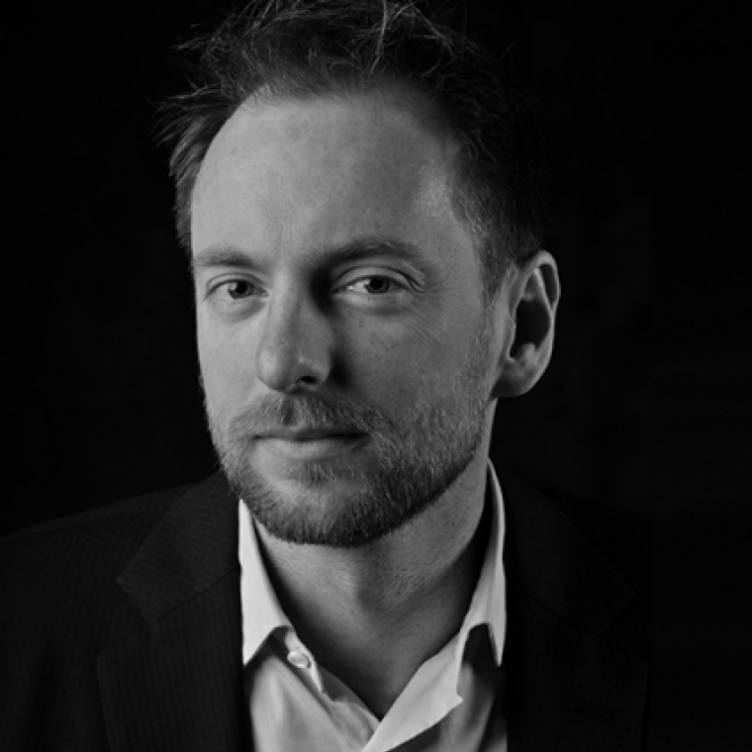
ITA on Semi-Autonomous Design | 06 December 2022
This talk, full title "Semi-Autonomous Design - Design via Orchestration of Events", explores the semi-autonomous approach to algorithmic design, robotic manufacturing and collective robotic construction. The talk was given by Robert Stuart-Smith, who is an Assistant Professor of Architecture at the University of Pennsylvania. Thank you!
ITA Open Talks | Spring Semester 2022
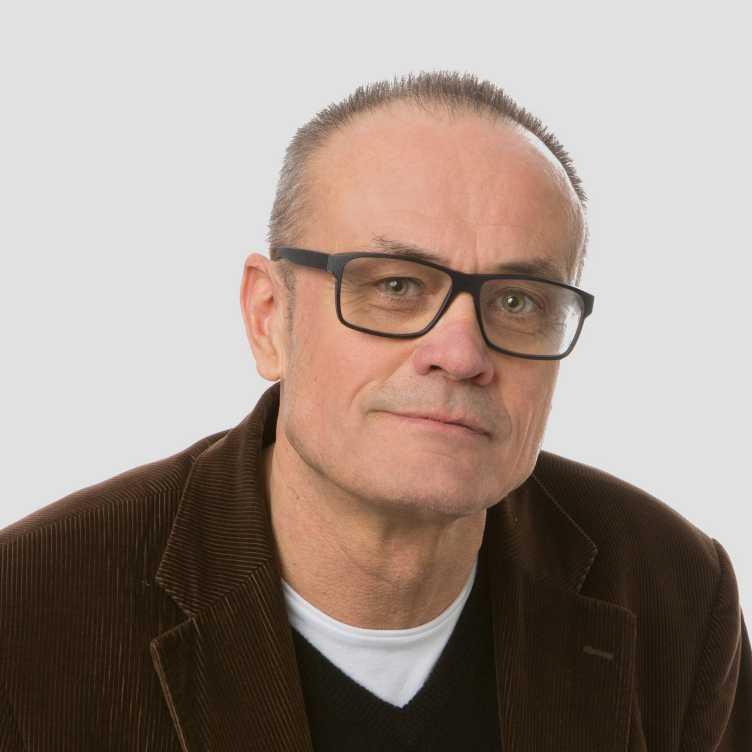
ITA on Erstwhile High Tech | 28 April 2022
The presentation by Peter Berger (Theo Hotz Partner, Zurich) focused on designs for modern but never fashionable building envelopes developed out of the respective zeitgeist.
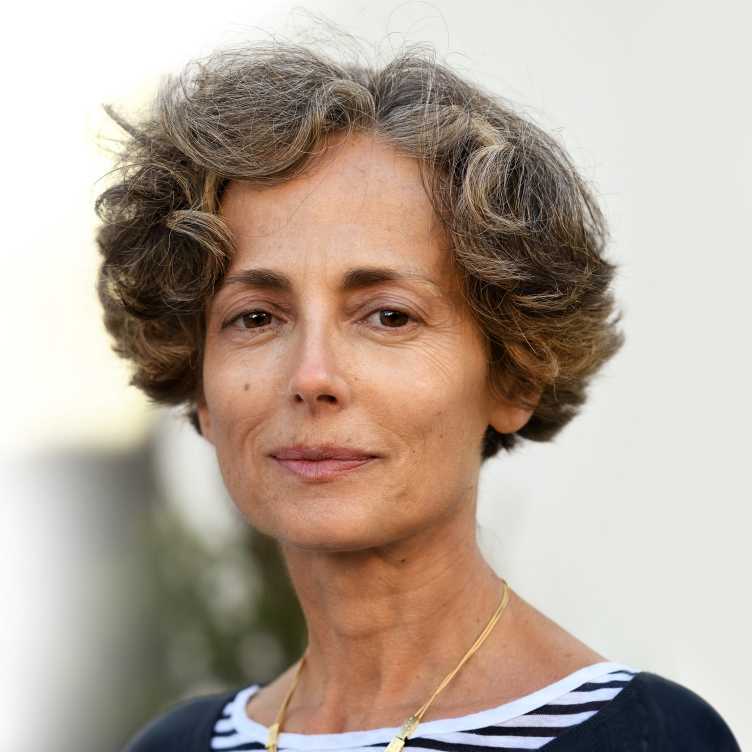
ITA on Designing for New Climates | 15 March 2022
Paola Viganò, architect and urbanist, dealt in her lecture with the implications of entering the socio-ecological transition, its epistemological and ontological dimensions, through a series of design experiences at different scales.
ITA Open Talks | Fall Semester 2021
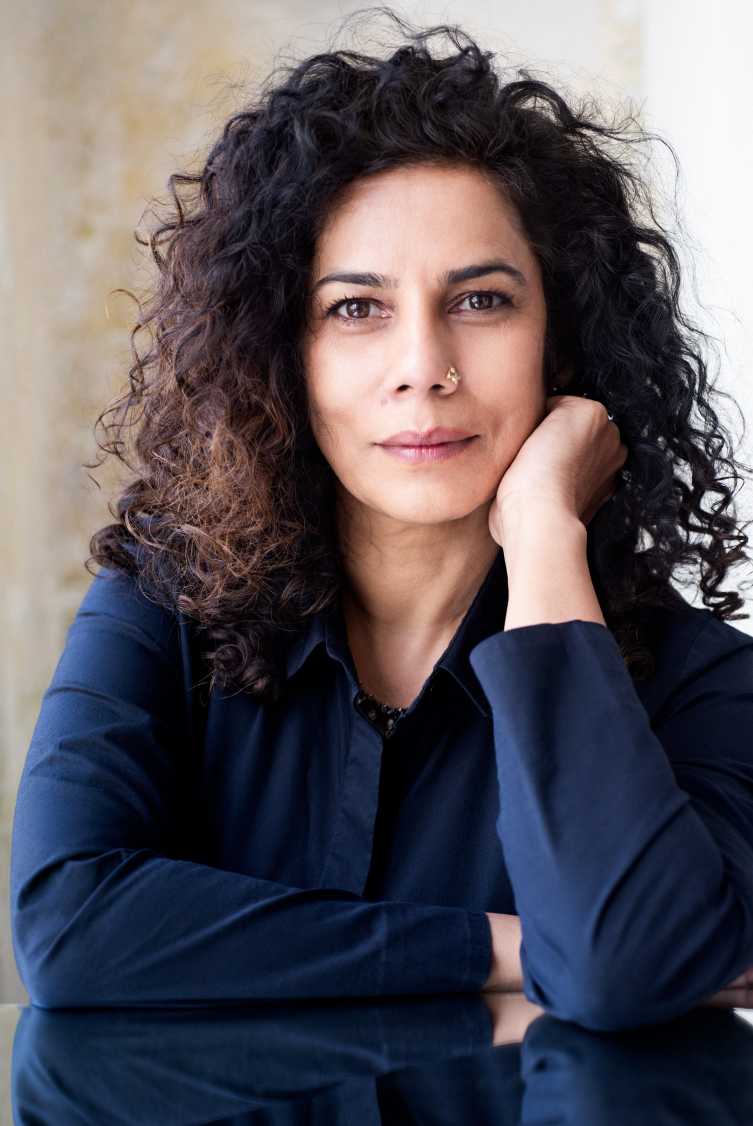
ITA on Rethinking Materiality | 18 November 2021
Anupama Kundoo discussed in her lecture the potential of architecture to address complex intersections of urbanization, people, technologies, resources, and the environment within the context of growing affordability issues. Her practice, the result of her quest for knowledge to build appropriately, considers projects as opportunities to build knowledge.
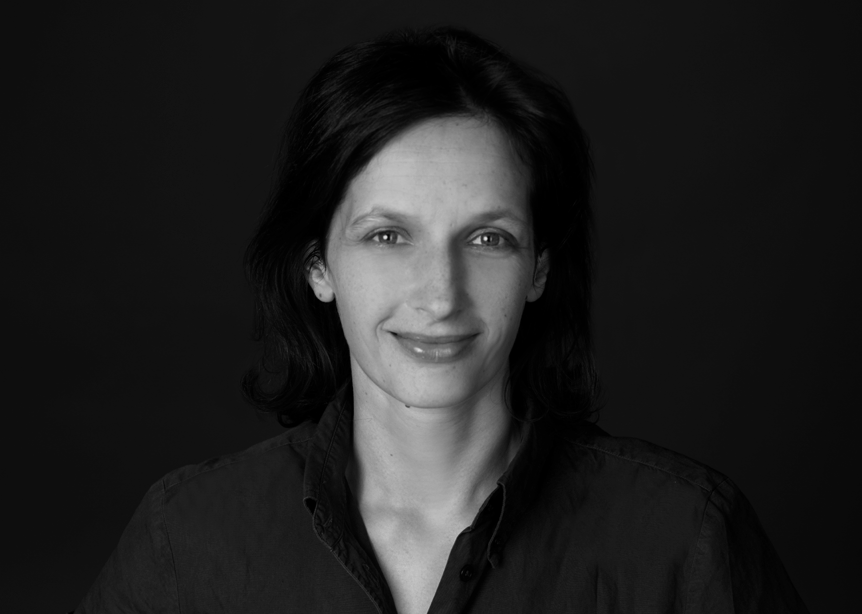
ITA on Digital Imagination | 13 October 2021
Nathalie Bredella is an architectural historian who examins how architects in the 1990s engaged with the digital and imagined future modes of practice. She argued in her lecture that the adoption of digital technology in architecture was far from linear but depended on complex factors, from the operative logic of the technology itself to the context in which it was used and the people who interacted with it.
ITA Open Talks | Spring Semester 2021
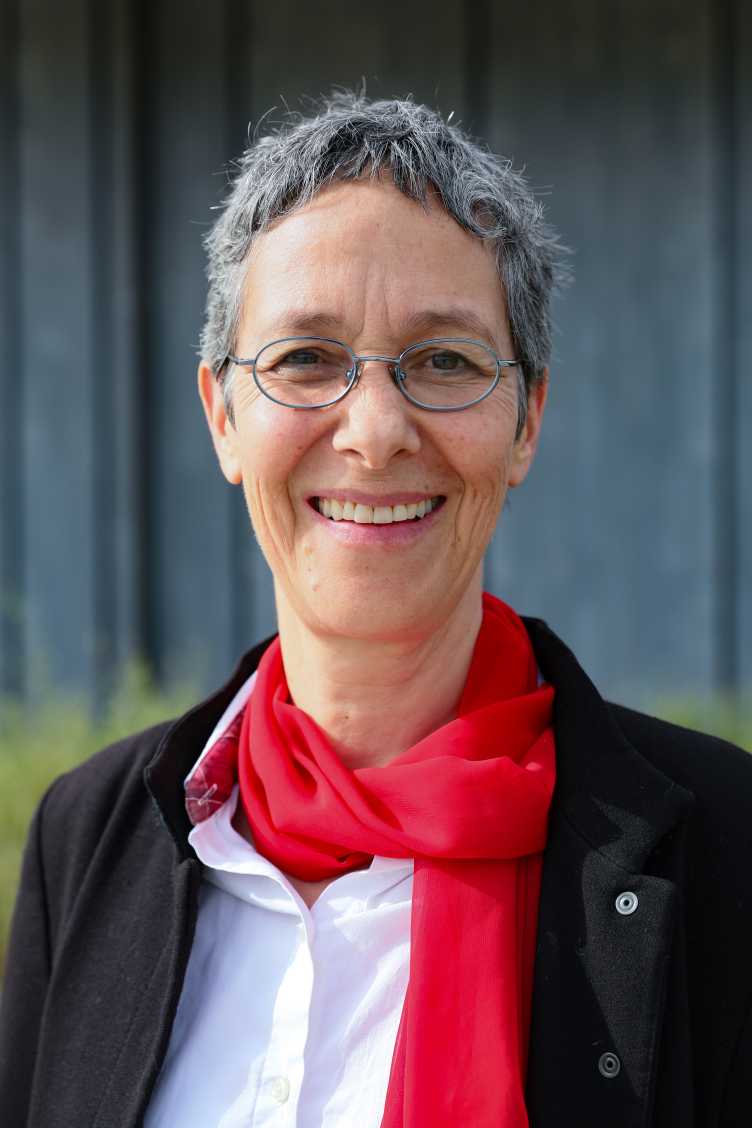
ITA on Energy Transition | 03 June 2021
Claudia Binder is the Dean of the School of Architecture, Civil and Environmental Engineering, holds the Swiss Mobiliar Chair for Urban Ecology at ENAC, EPFL (École polytechnique fédérale de Lausanne) and is the head of the laboratory for Human-Environment Relations in Urban Systems (HERUS) at EPFL. She presented in her lecture the transition from a centralized, fossil-fuel system to localized renewable energy, and how it affects housing, new energy technologies, and will foster a radical, systemic shift in patterns of social behavior and governance.
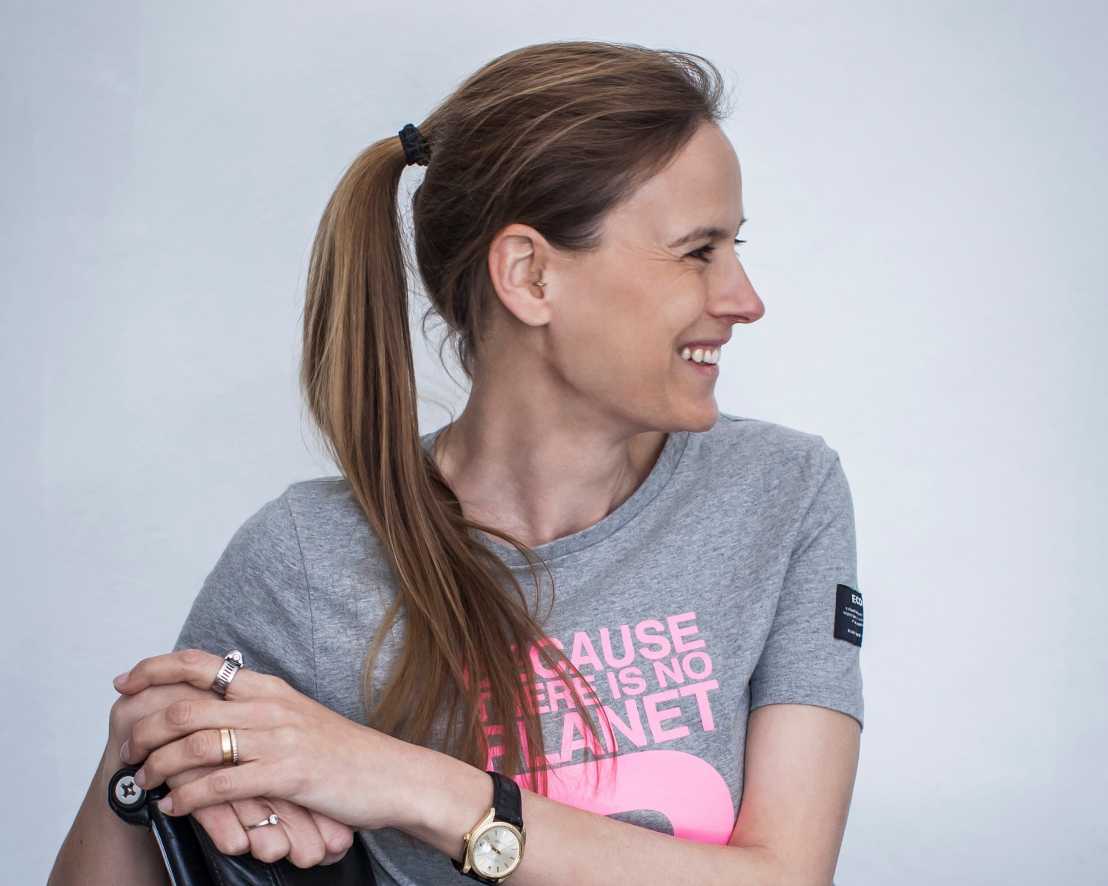
ITA on Construction Heritage | 17 May 2021
Silke Langenberg is Full Professor of Construction Heritage and Preservation at the Department of Architecture of ETH Zurich. She talked on the achievements of civil engineering as an important part of our cultural heritage and the challenge that the buildings are often not valued as monuments and protected as such.
ITA Open Talks | Fall Semester 2020
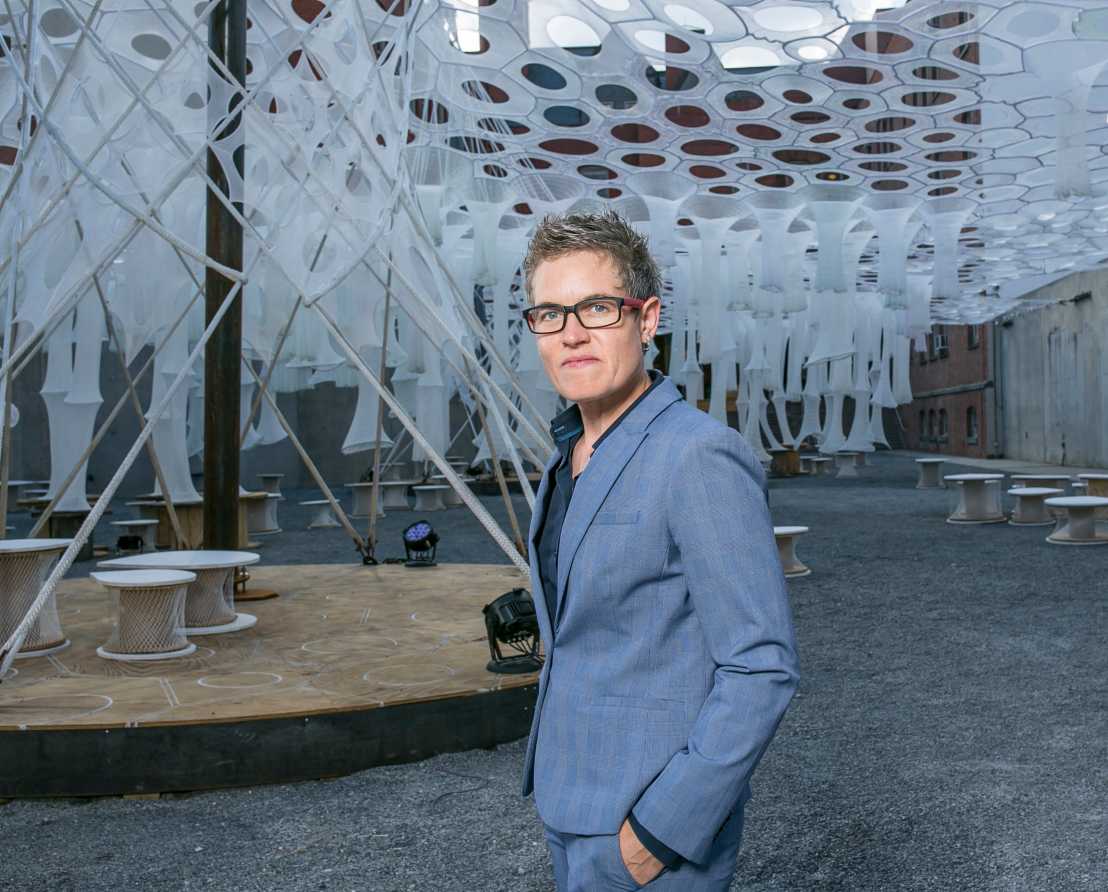
ITA on Transdisciplinary Architecture | 08 December 2020
Jenny E. Sabin is the Arthur L. and Isabel B. Wiesenberger Professor in Architecture at Cornell University and Principal at Jenny Sabin Studio. Her talk presented ongoing transdisciplinary research and design spanning across the fields of cell biology, materials science, physics, fiber science, fashion, mechanical and structural engineering, and architecture.
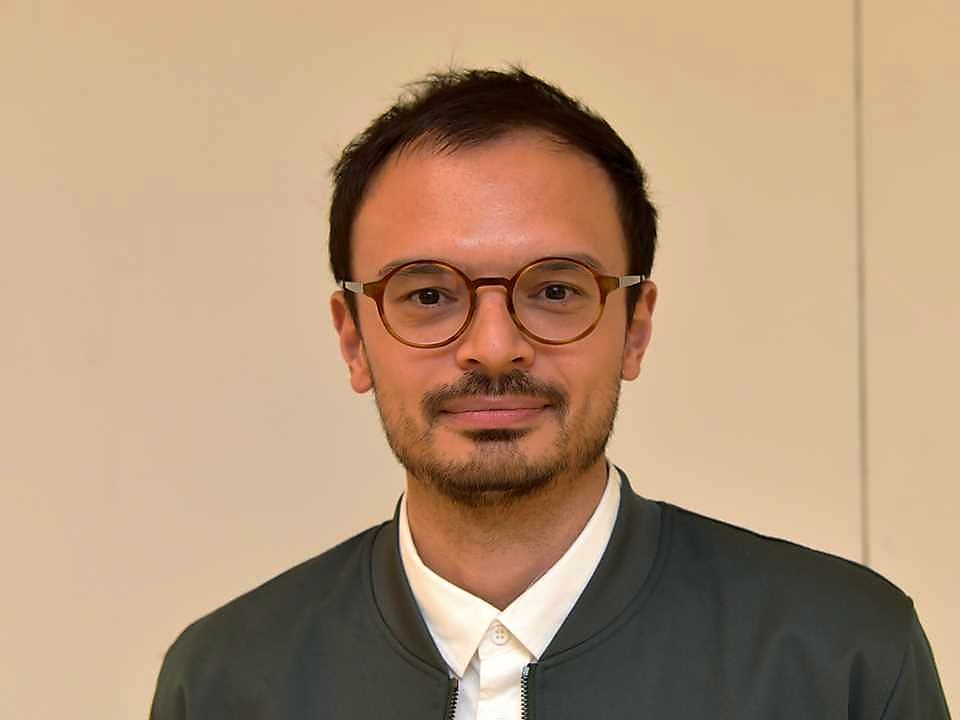
ITA on Biogenic Buildings | 10 November 2020 18:00
Salmaan Craig, Assistant Professor at McGill University in Montreal, discussed the dilemmas of carbon drawdown. He asks how to design biogenic materials to exchange fresh air and low-grade heat, simplify building systems, and store carbon for centuries ahead.
ITA Open Talks | Spring Semester 2020
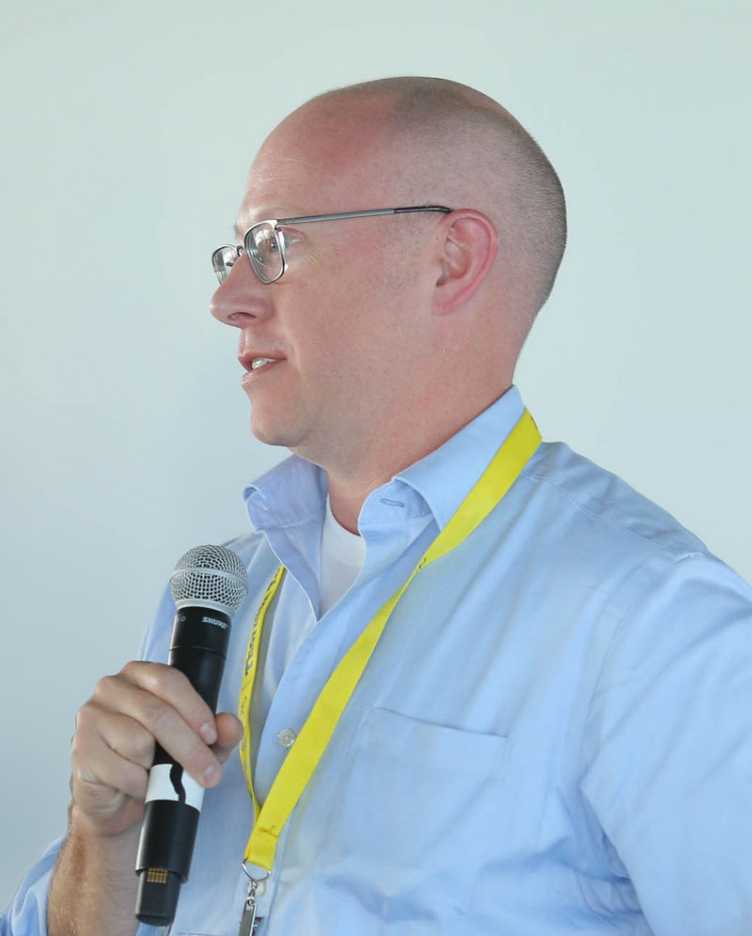
ITA on Gigafactories | 12 May 2020
Matt Jezyk, Senior Software Engineer at Tesla in Yardley, presented the ongoing development of work at Tesla that combines advanced manufacturing within the automotive sector with concepts of industrialized building for architecture.
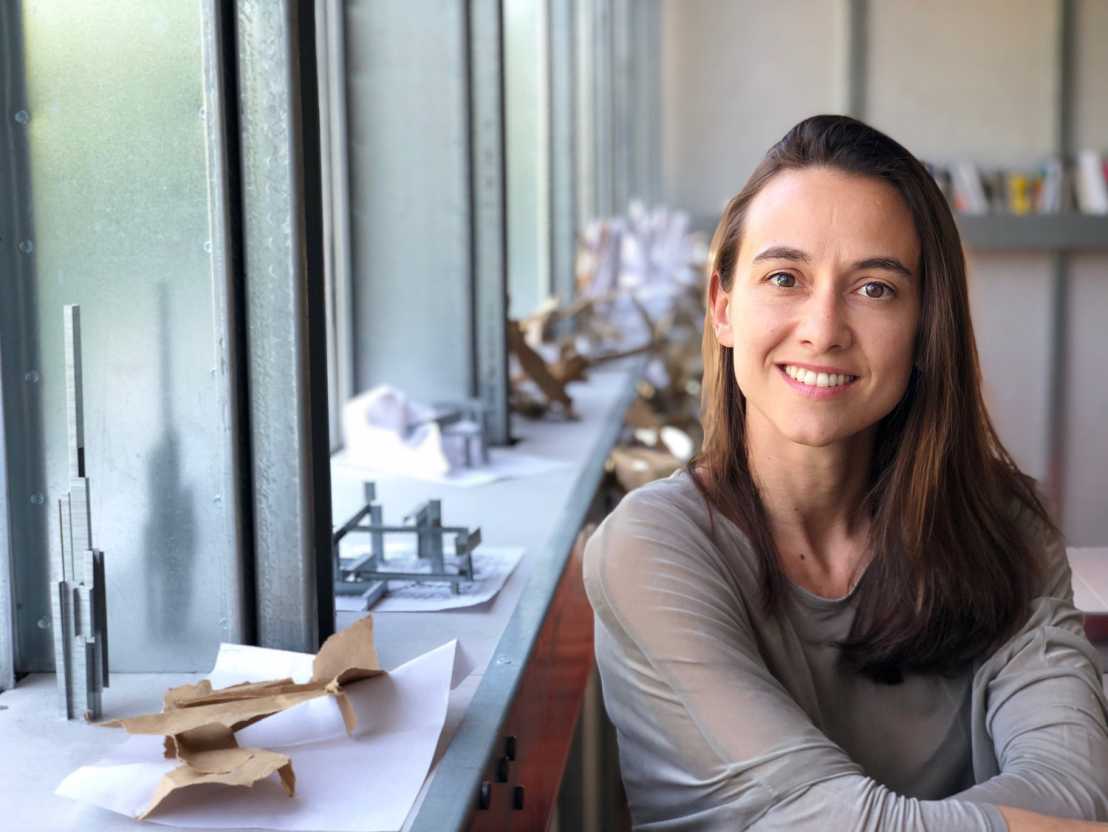
ITA on Onsite Offsite | 28 April 2020
Débora Mesa, architect and director of Ensamble Studio in Madrid, discussed in her lecture topics as diverse as landscape design or the prefabrication of the house, showing how technologies are sometimes appropriated, sometimes invented and always creatively used in the service of architecture.
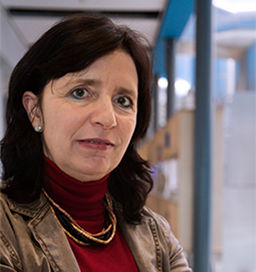
ITA on Smart Design | 26 March 2020
Petra Badke-Schaub, Professor of Design Theory and Methodology at the TU Delft, addressed in her lecture the question of how designers can be better supported in an increasingly complex world characterised by constantly emerging technologies and rapidly changing requirements.
ITA Open Talks | Fall Semester 2019
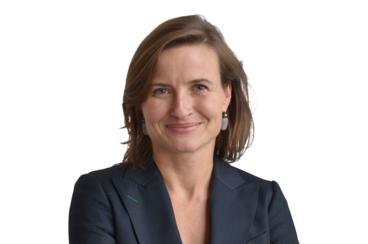
ITA on Circular Economies | 10 December 2019
Sabine Oberhuber, co-founder of Turntoo persented examples of materials reycling, and how her second company Madaster has implemented Swiss solutions for resource efficiency in the construction / real estate sectors with partners such as SBB, Raiffeisen Schweiz, Swiss Re AG.
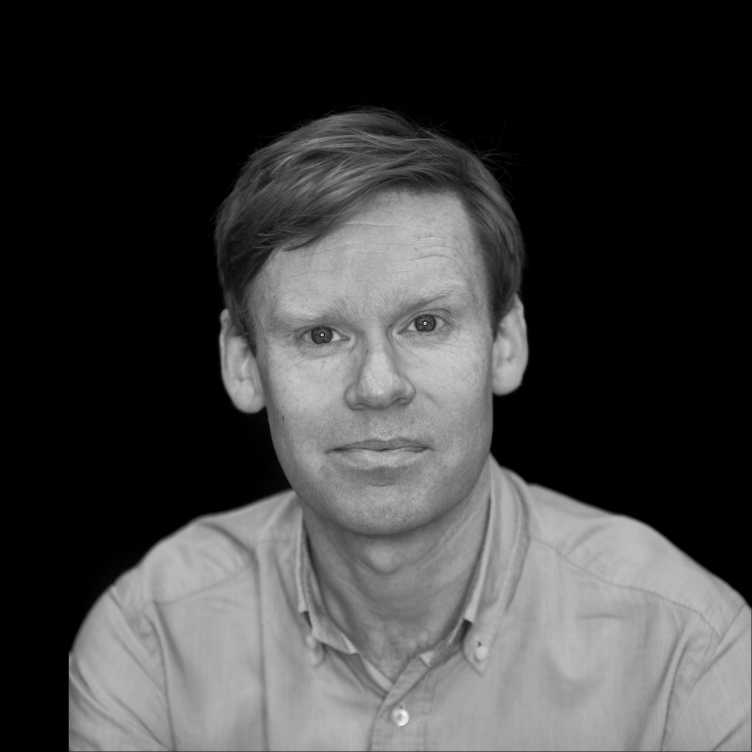
ITA on Evolving Design | 14 November 2019
John Harding, a lecturer at the University of Reading, discussed man-machine cooperation in the early stages of projects. He focused on structural form finding, evolutionary algorithms and machine learning for architectural design.
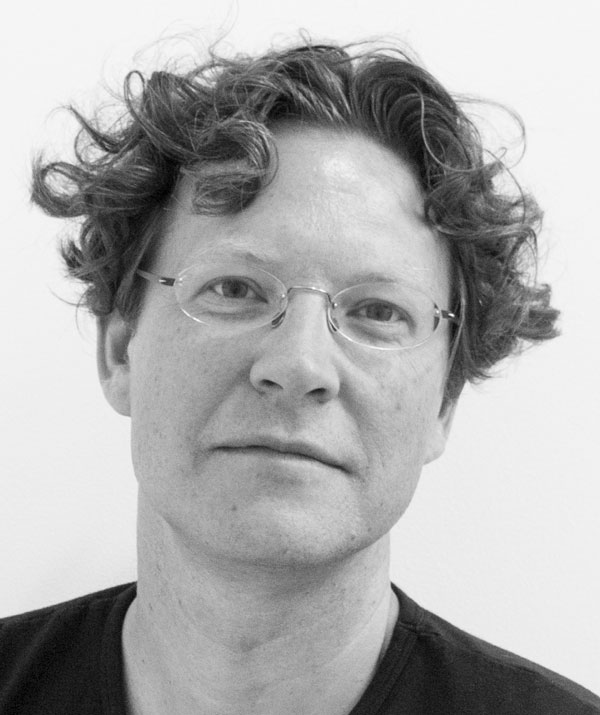
ITA on Environmental Modelling | 11 October 2019
Christoph Reinhart, Professor at MIT in Cambridge, discussed in his lecture the question of how computer modelling can use our digital resources in these turbulent times to improve the environmental performance of the built environment, including our quality of life.
ITA Open Talks | Spring Semester 2019
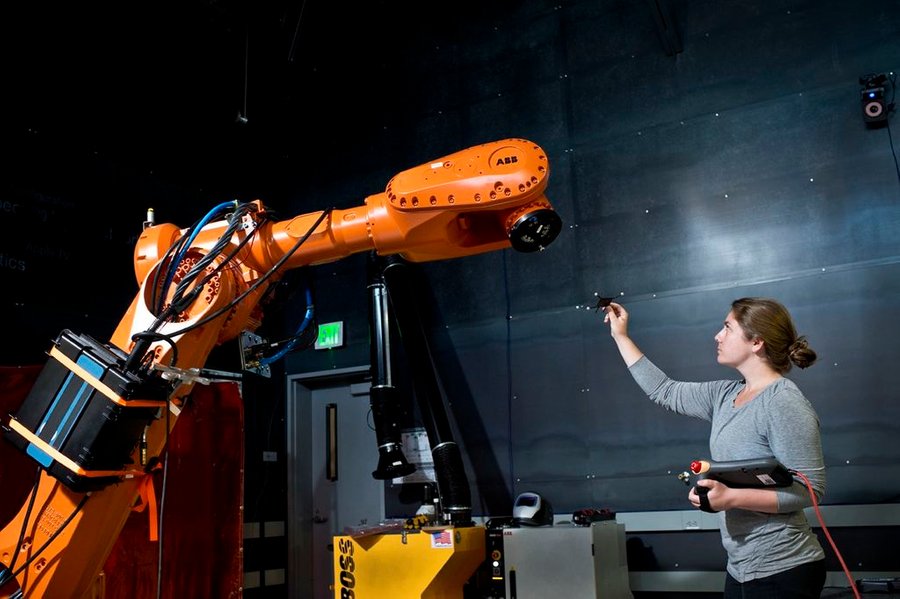
ITA on Robotics | 29 May 2019
Madeline Gannon, multidisciplinary designer and founder of Atonaton in Pittsburgh, discussed how to improve communication with machines and how art and technology can be combined to create a new future for human-robot relations.
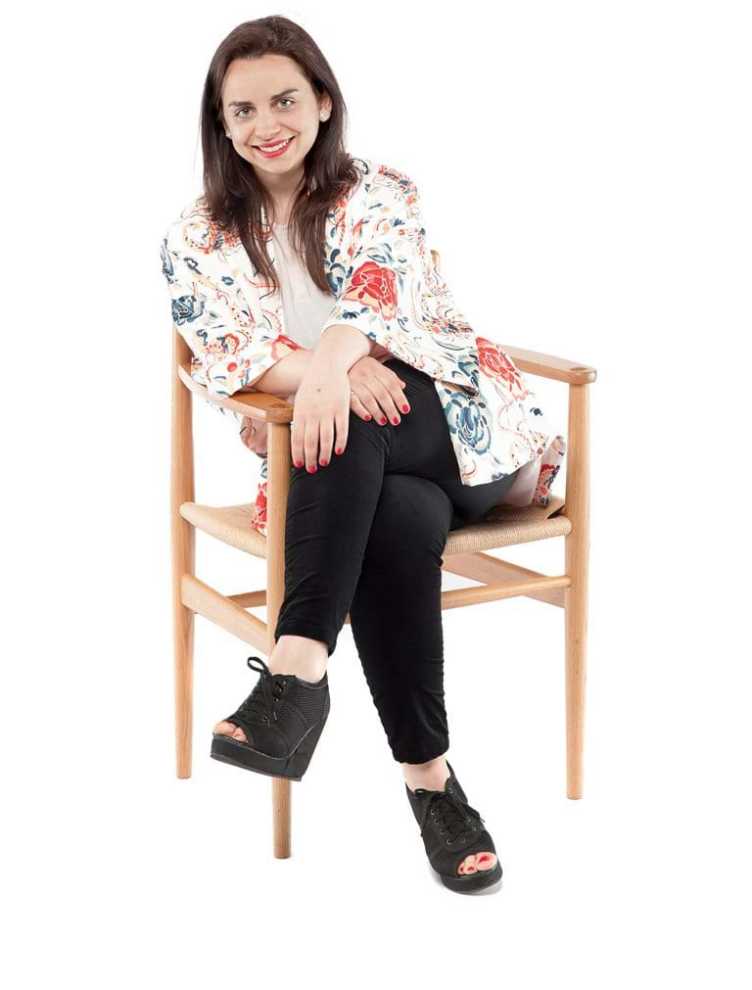
ITA on Computational Design | 17 April 2019
Martha Tsigkari works at Foster + Partners in London and is a specialist in a variety of areas including performance-driven design & optimization, interfaces & interaction, design-to-production and rapid feedback & integration. In her presentation she addressed the development of simulation tools and the creation of integrated processes and physical interfaces.
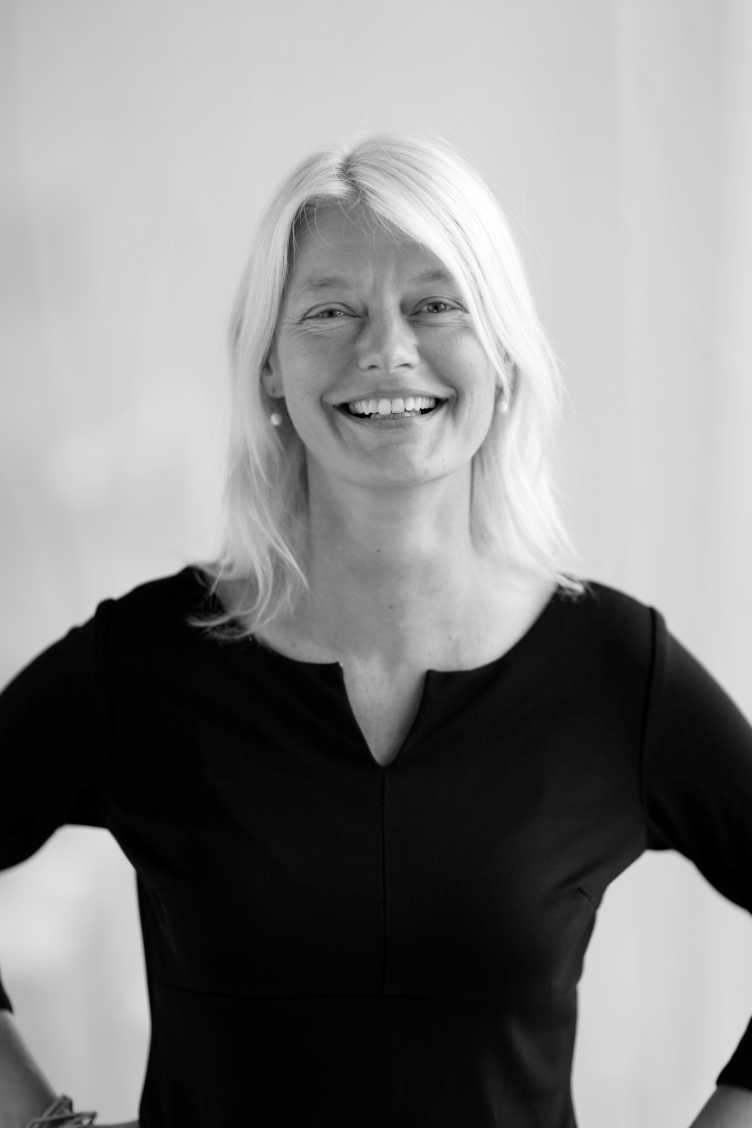
ITA on the Practices of Modern Architects | 13 March 2019
Jenny Osuldsen, is partner at Snøhetta and professor of landscape architecture at the Norwegian University and of sustainable urban design at Lund University in Sweden. In her lecture she discussed the work and transdisciplinary thinking of her company Snøhetta, which started as a collaborative architecture and landscape workshop.
ITA Open Talks | Fall Semester 2018
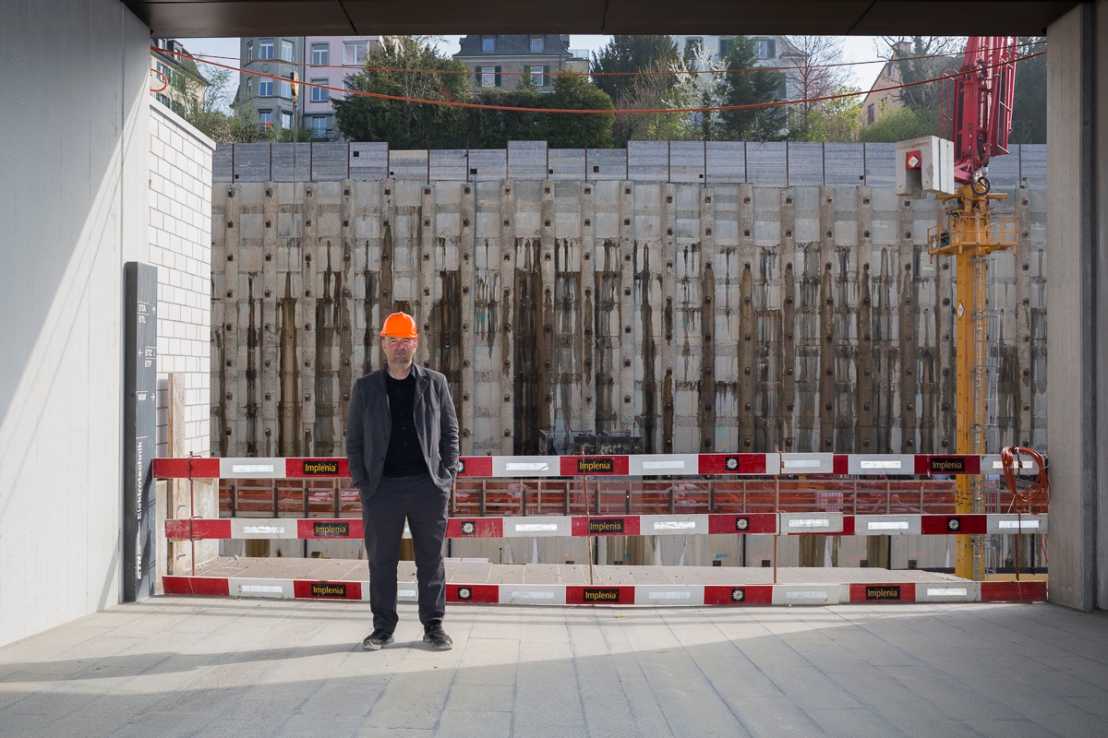
ITA on Designing for Integration | 17 December 2018
Roger Boltshauser's architectural practice is characterized by building projects with high spatial and material density. He discussed prestigious projects such as the Ozeanium Aquarium in Basel.
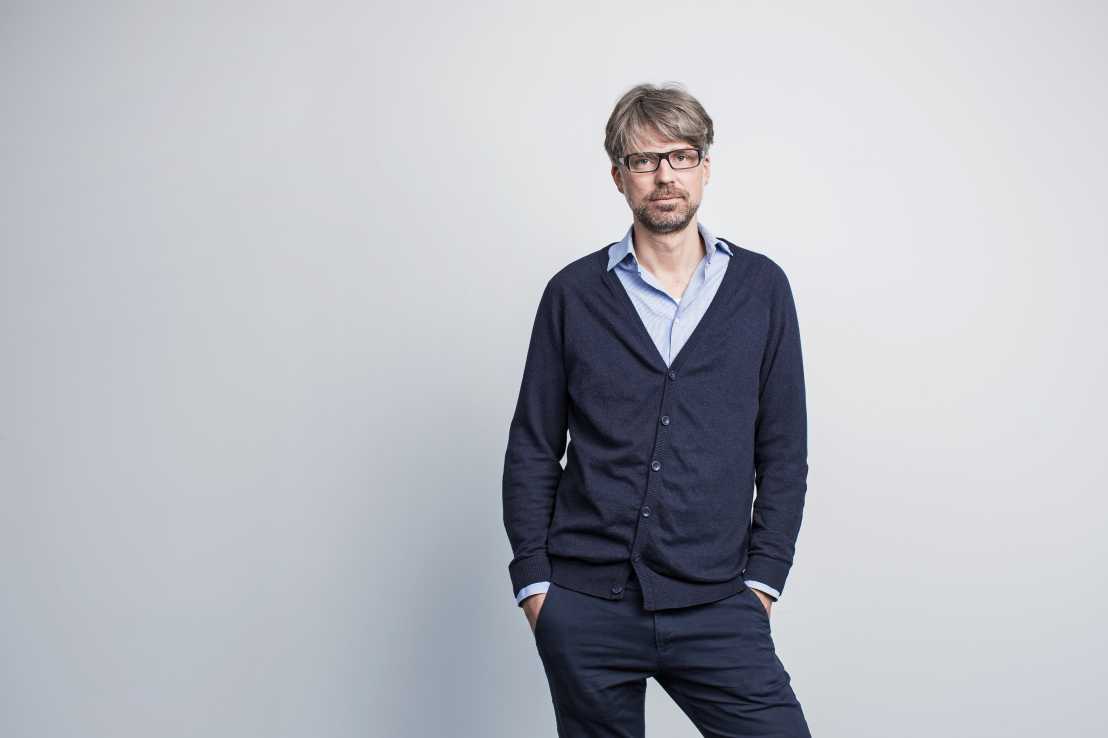
ITA on Building Innovation | 28 November 2018
In his lecture, Jan Wurm, head of ARUP Berlin, discussed the integration of architectural demands, materials, building technology and the potential in the field of system design and innovation.
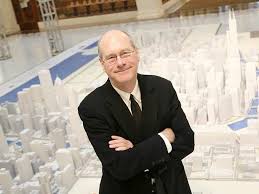
ITA on Structuring Tall Buildings | 10 October 2018
Bill Baker is a partner in the building construction division at SOM in Chicago, where he has been managing the building construction program for over 20 years. In his lecture he gave an insight into his expertise.